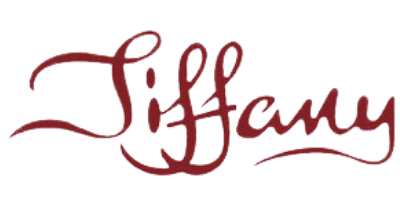Contacts
Enroll in a second degree program and get a generous 20% discount!
Reguest
Enroll in a second degree program and get a generous 20% discount!
Reguest
Tiffany School of Advanced Aesthetics and Electrolysis is registered as a career college under the Ontario Career Colleges Act, 2005
(See link to the Ministry of Colleges and Universities of Ontario at www.pcc.tcu.gov.on.ca/PARISSearchWeb/searchResult.xhtml)
Take a short quiz and get a discount on tuition
at Tiffany School of Aesthetic Cosmetology
Do you want to get a diploma in the beauty industry? If yes, then why:
Which direction in the beauty industry are you most interested in (choose several):
What time is most convenient for you to take training
How old are you
What is your name
Your phone number
Take a short quiz and get a discount on tuition
at Tiffany School of Aesthetic Cosmetology
Do you want to get a diploma in the beauty industry? If yes, then why:
Which direction in the beauty industry are you most interested in (choose several):
What time is most convenient for you to take training
How old are you
What is your name
Your phone number
Beauty can be a profession
Beauty can be a profession
NOW LET’S SEE IF IT’S A RIGHT FIT
Our cosmetology school is for you, if:
1
You are keen on aesthetic cosmetology and want to start your career in beauty industry.
2
Already tried working in Canadian beauty salons, but would like to become a certified
specialist and earn more money.
3
Are looking for a job and want to begin with cosmetology.
4
Want to gain more knowledge in cosmetology for your own benefit (e. g. skip expensive beauty treatments at salons an do it yourself instead) and to have access to professional cosmetics.
Reguest

NOW LET’S SEE IF IT’S A RIGHT FIT
Our cosmetology school is for you, if:
1
You are keen on aesthetic cosmetology and want to start your career in beauty industry.
2
Already tried working in Canadian beauty salons, but would like to become a certified specialist and earn more money.
3
Are looking for a job and want to begin with cosmetology.
4
Want to gain more knowledge in cosmetology for your own benefit (e. g. skip expensive beauty treatments at salons an do it yourself instead) and to have access to professional cosmetics.
Reguest
6 REASONS TO STUDY AT TIFFANY SCHOOL
With us you get:
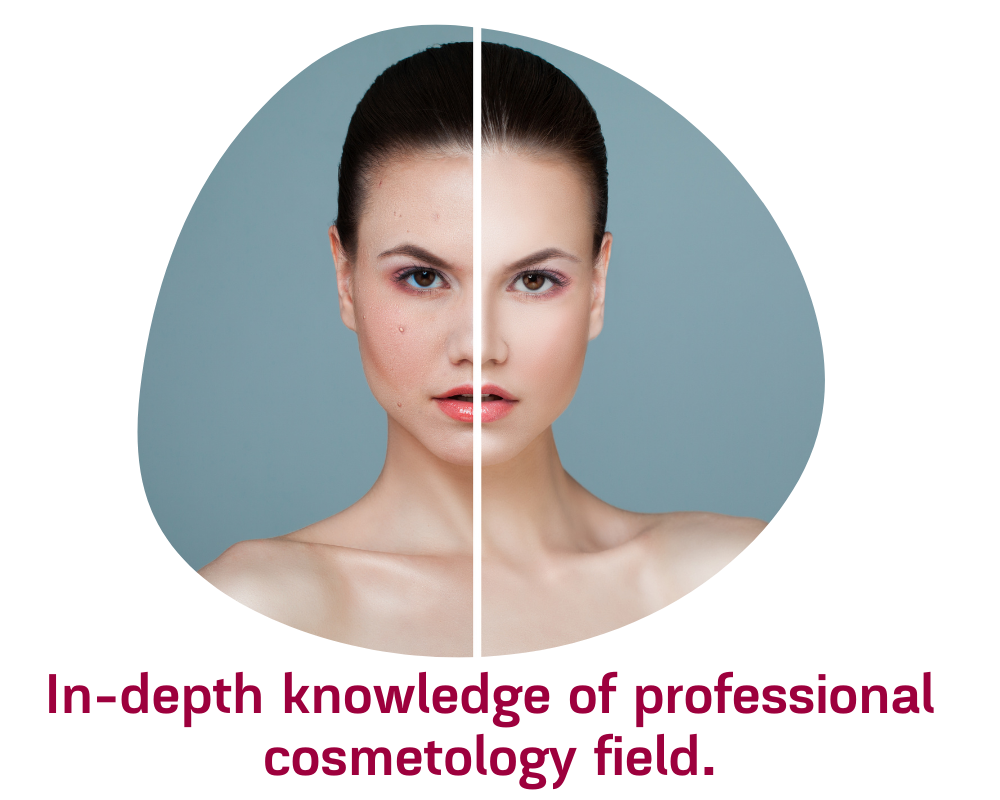





Reguest
6 REASONS TO STUDY AT TIFFANY SCHOOL
With us you get:






Reguest
ABOUT TIFFANY SCHOOL
Our school has been in the market for more than 30 years. Starting from 2007 its owner and permanent teacher is Olga Erdyakova and since then she has successfully trained 150 students.
Olga Erdyakova is a cosmetologist, psychotherapist, aromatherapist and naturopath with 35 years of experience in Canada, Ukraine and Kazakhstan.
At our school, we offer the latest products, trainings and techniques. We are committed to helping our students find rewarding careers and we are extremely proud of them. Get the skills you need for this competitive career! By increasing your knowledge today, you can plan on increasing your income tomorrow.
Reguest
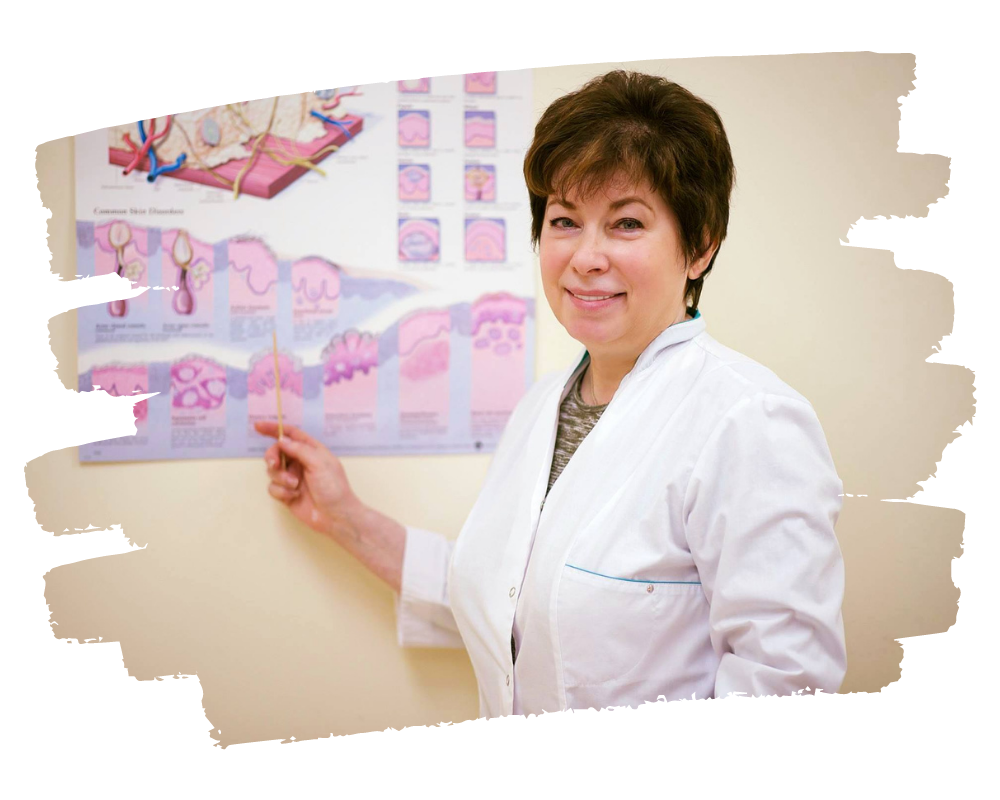
ABOUT TIFFANY SCHOOL

Our school has been in the market for more than 30 years. Starting from 2007 its owner and permanent teacher is Olga Erdyakova and since then she has successfully trained 150 students.
Olga Erdyakova is a cosmetologist, psychotherapist, aromatherapist and naturopath with 35 years of experience in Canada, Ukraine and Kazakhstan.
At our school, we offer the latest products, trainings and techniques. We are committed to helping our students find rewarding careers and we are extremely proud of them. Get the skills you need for this competitive career! By increasing your knowledge today, you can plan on increasing your income tomorrow.
Reguest
Diploma Programs
We offer Diploma Programs
There exists a growing demand for qualified professionals in the beauty industry. Tiffany School of Advanced Esthetics and Electrolysis is striving to fill these positions with graduates who are not just well-trained, but who have the absolute best in beauty training currently available. We are working very hard to become the “reference-point” in Canadian esthetic training. Our high standards ensure that the Tiffany School of Advanced Esthetics and Electrolysis name on your diploma will make a difference.
The Advanced Aesthetics Diploma Program offers the fundamental skills on providing an overall sense of well-being and establishing techniques on the beautification of skin based on each client's individual needs. We prepare our students with knowledge, skills, professional competencies and the experience required to provide a variety of spa services, including facials, hair removal, make-up application, body treatments, as well as hand and foot treatments.
Advanced AestheticsApproved as a vocational program under the Ontario Career Colleges Act, 2005
Skin care
Manicure/pedicure
Waxing
Body care
Aromatherapy1
Aromatherapy
In this course students will gain theoretical and practical knowledge of natural oils extracted from flowers, bark, stems, leaves, roots or other parts of a plant to enhance psychological and physical well-being. Students will benefit from the professional use of essential oils, face care, body treatments etc. 40 Hours.
Decontamination & infection control
Decontamination & infection control
This subject will provide students with all the necessary elements to help control dangerous disease-causing germs. By following some of the very important basic procedures and by providing a clean space it will be easy to offer your future clients the best professional care without the fear of your clients becoming infected by a disease agent. Students also will study the types and classification of bacteria, viruses and parasites. Students will gain strong knowledge in principles of preventing diseases, types of disinfectants, disinfection procedures. We will teach our students the professional image and importance of OSHA and M.S.D.S.
Reflexology
Reflexology
Students will learn anatomy and physiology of feet and hands in order to apply pressure with specific thumb, finger and hand techniques. In reflexology practice, technique is applied to the relevant reflex area(s) to prompt a change in the related part of the body. Students will learn history of reflexology and will acquire knowledge of zones, meridians and relaxation response. This program covers toning, slimming treatments and massage techniques. 140 Hours.
Salon management
Salon management
In this unit students will learn everything about administration, advertising and inventory of basic salon management. This program has been designed to teach students about product display, client consultation methods, basic bookkeeping and product purchasing. Students will also gain a strong knowledge of salon services and sales drivers.
1292 hours, $8900
Personal discount available
Reguest
ElectrolysisApproved as a vocational program under the Ontario Career Colleges Act, 2005
If you take Advanced Aesthetics course ($8900), you will get 20% discount at the Electrolysis course.
PROGRAM DURATION OF ELECTROLYSIS
A proven hair removal technique program that is effective and safe. This permanent hair removal method is medically approved. The demand for professionally trained electrolysis specialists is increasing, as the public becomes aware of the treatments the electrologist offers. This program includes theoretical and practical knowledge of permanent hair removal, anatomy, dermatology, sterilization, professional ethics, equipment for electrolysis, practical training in electrolysis, thermolysis, blend, using manual and computerized methods. Models are provided for practice throughout the program.
1.Indications and contraindications to electrolysis
2.Other types of hair removal
3.Anatomy and physiology of the body’s system
4.Anatomy and physiology of the skin and hair
5.Hair growth cycle stimulation of hair grown
6.Endocrine system and hormones
7.Hygiene, bacteriology and disinfection
8.Recognition of skin disorders
9.Electricity
10.Practical application
150 hours, $2800
Personal discount available
Reguest
Diploma Programs
We offer Diploma Programs
There exists a growing demand for qualified professionals in the beauty industry. Tiffany School of Advanced Esthetics and Electrolysis is striving to fill these positions with graduates who are not just well-trained, but who have the absolute best in beauty training currently available. We are working very hard to become the “reference-point” in Canadian esthetic training. Our high standards ensure that the Tiffany School of Advanced Esthetics and Electrolysis name on your diploma will make a difference.
The Advanced Aesthetics Diploma Program offers the fundamental skills on providing an overall sense of well-being and establishing techniques on the beautification of skin based on each client's individual needs. We prepare our students with knowledge, skills, professional competencies and the experience required to provide a variety of spa services, including facials, hair removal, make-up application, body treatments, as well as hand and foot treatments.
Advanced Aesthetics
Approved as a vocational program under the Ontario Career Colleges Act, 2005.
Skin care
Manicure/pedicure
Waxing
Body care

Aromatherapy
Aromatherapy
In this course students will gain theoretical and practical knowledge of natural oils extracted from flowers, bark, stems, leaves, roots or other parts of a plant to enhance psychological and physical well-being. Students will benefit from the professional use of essential oils, face care, body treatments etc. 40 Hours.
Decontamination & infection control
Decontamination & infection control
This subject will provide students with all the necessary elements to help control dangerous disease-causing germs. By following some of the very important basic procedures and by providing a clean space it will be easy to offer your future clients the best professional care without the fear of your clients becoming infected by a disease agent. Students also will study the types and classification of bacteria, viruses and parasites. Students will gain strong knowledge in principles of preventing diseases, types of disinfectants, disinfection procedures. We will teach our students the professional image and importance of OSHA and M.S.D.S.
Reflexology
Reflexology
Students will learn anatomy and physiology of feet and hands in order to apply pressure with specific thumb, finger and hand techniques. In reflexology practice, technique is applied to the relevant reflex area(s) to prompt a change in the related part of the body. Students will learn history of reflexology and will acquire knowledge of zones, meridians and relaxation response. This program covers toning, slimming treatments and massage techniques. 140 Hours.
Salon management
Salon management
In this unit students will learn everything about administration, advertising and inventory of basic salon management. This program has been designed to teach students about product display, client consultation methods, basic bookkeeping and product purchasing. Students will also gain a strong knowledge of salon services and sales drivers.
1292 hours, $8900 Personal discount available
Reguest
Electrolysis
Approved as a vocational program under the Ontario Career Colleges Act, 2005.
If you take Advanced Aesthetics course ($8900), you will get 20% discount at the Electrolysis course.
If you only select the Electrolysis course, the discount is 10 %.
PROGRAM DURATION OF ELECTROLYSIS
A proven hair removal technique program that is effective and safe. This permanent hair removal method is medically approved. The demand for professionally trained electrolysis specialists is increasing, as the public becomes aware of the treatments the electrologist offers. This program includes theoretical and practical knowledge of permanent hair removal, anatomy, dermatology, sterilization, professional ethics, equipment for electrolysis, practical training in electrolysis, thermolysis, blend, using manual and computerized methods. Models are provided for practice throughout the program.
1.Indications and contraindications to electrolysis
2.Other types of hair removal
3.Anatomy and physiology of the body’s system
4.Anatomy and physiology of the skin and hair
5.Hair growth cycle stimulation of hair grown
6.Endocrine system and hormones
7.Hygiene, bacteriology and disinfection
8.Recognition of skin disorders
9.Electricity
10.Practical application

150 hours, $2800 Personal discount available
Reguest

Certificate Programs
Skin care 646 hours
$4300Personal discount available

Skin care
Skin Care Layout & Aesthetics Theory. In this course, students will learn classification of skin types, basic classification and chemistry of skin care products. Students will learn basic facial massage techniques, facial treatments, electrotherapy, and light therapy. Emphasis is placed on personal hygiene, proper sanitation and sterilization procedures. The workshops will help to gain practical experience in addition to theoretical.
The range of theoretical knowledge and treatments performed by an aesthetician include:
1. The structure and function skin, sebaceous and sweat glands.
2. Head and neck lymphatic system and muscles.
3. The main skin types. Skin care programs for various skin types.
4. Normal and Problematic skin care.
5. Cleansing.
• Manual.
• Manual-Automatic.
• UZV (ultrasonic).
• Atraumatic hygienic skin cleansing with the use of cosmeceuticals.
• Aesthetic correction of age-related skin changes using cosmeceuticals and chemical peels.
• Aesthetic correction of acne, post-acne, pigmentation and rosacea using combined techniques and cosmetology equipment.
• Complex treatments with the use of specialized varied massage techniques
6. Peelings, basic provisions. All-season, new generation multifunctional peelings.
7. Types of skin aging. Anti-Age programs.
8. Hardware cosmetology: diamond microdermabrasion, electroporation (non-injection mesotherapy technique), photochromo procedure, "heat-cold" procedure, face biolifting (microcurrents), RF-lifting.
This program does not require approval under Private Career Colleges Act, 2005
Manicure/pedicure 150 hours
$1500Personal discount available

Manicure/pedicure
This course will provide students with all the necessary theoretical and practical knowledge in order to perform manicure and pedicure, paraffin treatments, hand and feet relaxation massage, French manicure/pedicure. Students will learn the anatomy of hands and feet, common foot problems and nail diseases. The professional use of spa equipment and products will be taught in this course as well.
This program does not require approval under Private Career Colleges Act, 2005.


Waxing 100 hours
$1500Personal discount available
Waxing
In this course students will learn the structure and function of hair, the hair growth cycle, the difference between normal, unusual hair growth and hair disorders. Students will learn waxing methods used in both facial and body hair removal, before and after waxing treatment. Emphasis is placed on hygiene, sterilization, and safety precautions (especially proper use of wax heaters).
This program does not require approval under Private Career Colleges Act, 2005.

Body care 140 hours
$2700Personal discount available
Body care
Professional Body Care
In this course students will learn anatomy of human body: skeleton, muscular, lymphatic, nervous, endocrine systems. The area of focus will be on client’s health and creation of a customized program to accommodate specific client needs. Students will learn necessary skills to perform toning, slimming treatments and massage techniques. 140 Hour.
This program does not require approval under Private Career Colleges Act, 2005.
Reguest


Certificate Programs
Skin care 646 hours
$4300

Skin care
Skin Care Layout & Aesthetics Theory. In this course, students will learn classification of skin types, basic classification and chemistry of skin care products. Students will learn basic facial massage techniques, facial treatments, electrotherapy, and light therapy. Emphasis is placed on personal hygiene, proper sanitation and sterilization procedures. The workshops will help to gain practical experience in addition to theoretical.
The range of theoretical knowledge and treatments performed by an aesthetician include:
1. The structure and function skin, sebaceous and sweat glands.
2. Head and neck lymphatic system and muscles.
3. The main skin types. Skin care programs for various skin types.
4. Normal and Problematic skin care.
5. Cleansing.
• Manual.
• Manual-Automatic.
• UZV (ultrasonic).
• Atraumatic hygienic skin cleansing with the use of cosmeceuticals.
• Aesthetic correction of age-related skin changes using cosmeceuticals and chemical peels.
• Aesthetic correction of acne, post-acne, pigmentation and rosacea using combined techniques and cosmetology equipment.
• Complex treatments with the use of specialized varied massage techniques
6. Peelings, basic provisions. All-season, new generation multifunctional peelings.
7. Types of skin aging. Anti-Age programs.
8. Hardware cosmetology: diamond microdermabrasion, electroporation (non-injection mesotherapy technique), photochromo procedure, "heat-cold" procedure, face biolifting (microcurrents), RF-lifting.
This program does not require approval under Private Career Colleges Act 2005.

Manicure/pedicure
This course will provide students with all the necessary theoretical and practical knowledge in order to perform manicure and pedicure, paraffin treatments, hand and feet relaxation massage, French manicure/pedicure. Students will learn the anatomy of hands and feet, common foot problems and nail diseases. The professional use of spa equipment and products will be taught in this course as well.
This program does not require approval under Private Career Colleges Act 2005.
Manicure / pedicure 150 hours
$1500
Waxing 100 hours
$1500

Waxing
In this course students will learn the structure and function of hair, the hair growth cycle, the difference between normal, unusual hair growth and hair disorders. Students will learn waxing methods used in both facial and body hair removal, before and after waxing treatment. Emphasis is placed on hygiene, sterilization, and safety precautions (especially proper use of wax heaters).
This program does not require approval under Private Career Colleges Act 2005.

Body care
Professional Body Care
In this course students will learn anatomy of human body: skeleton, muscular, lymphatic, nervous, endocrine systems. The area of focus will be on client’s health and creation of a customized program to accommodate specific client needs. Students will learn necessary skills to perform toning, slimming treatments and massage techniques. 140 Hour.
This program does not require approval under Private Career Colleges Act 2005.
Body care 140 hours
$2700
Reguest
HOW THE TRAINING GOES
Course start date: every first day of each month.
Length of course: depends on the selected program.
Class times available: Monday to Friday. Morning/afternoons and evenings.
Number of hours a week: 30 hours.
School holidays: December 25-January 2, April 12, May 18, July 1, August 3, September 7, October 12.
Maximum 6 students per class.
HOW THE TRAINING GOES
Course start date: every first day of each month.
Length of course: depends on the selected program.
Class times available: Monday to Friday. Morning/afternoons and evenings.
Number of hours a week: 30 hours.
School holidays: December 25-January 2, April 12, May 18, July 1, August 3, September 7, October 12.
Maximum 6 students per class.
REFUND POLICY
Fee Refund Policy as Prescribed under s. 24 (2) to 33 of O.Reg. 415/06
Fee Refund Policy as Prescribed under s. 24 (2) to 33 of O.Reg. 415/06
24. (2) In sections 25 to 27,
“earned fees” means the amount of all fees paid for a vocational program that is proportional to the number of instruction hours that have taken place when a withdrawal or expulsion occurs; (“droits acquis”)
“program mid-point” means the point in the progress of a vocational program where half of the scheduled hours of instruction for the program have taken place; (“mi-parcours du programme”)
“service fee” means the lesser of 20 per cent of all vocational program fees and $500. (“frais de service”)
Full refunds
25. If a student has entered into a contract with a career college for a vocational program, the college shall give a refund of all fees paid for the program in the following circumstances:
The student rescinds (cancels) the contract in writing within two days of receiving a copy of it, in accordance with section 36 of the Act.
Before the student completes the program, the college discontinues the program or the college’s approval to provide the program is revoked by the Superintendent, but the college remains registered under the Act.
The college collects any fees before receiving a certificate of registration from the Superintendent.
The college collects any fees before the program was approved by the Superintendent.
The college collects any fees other than a service fee before the student has entered into a contract with the college.
The college expels the student in a manner or for reasons that are contrary to the college’s expulsion policy.
The college does not provide an evaluation, in writing, of the student’s progress as required under section 12.
The student voids the contract under subsection 18 (2) due to a statement, image or video made by the college that is prohibited under subsection 18 (1).
The student voids the contract under section 22 because it is missing a term required under section 20.
The student receives instruction from an instructor who is not qualified under section 41 for more than 10 per cent of the program’s duration.
Full refunds minus service fee
26. A career college shall give a refund of all fees paid for a vocational program, except the service fee, in the following circumstances:
The student gives written notice to the college, before the program start date specified in the student’s contract with the college, that the student is withdrawing from the program.
The student is admitted to the program on the condition that the student meet specified admission requirements before the program start date specified in the student’s contract with the college, and the student does not meet the requirements before that day.
The student does not attend the program within the first 14 days of the program after the program start date specified in the student’s contract with the college and is given written notice that the contract is cancelled from the college within the first 45 days of the program.
The college is notified by or on behalf of an international student before the program mid-point that the international student has not been issued a temporary resident visa as a member of the student class under the Immigration and Refugee Protection Act (Canada).
Partial refunds
27. (1) A career college shall give a student a refund of the fees paid for a vocational program in accordance with this section if,
the student withdraws from the program after the program start date specified in the student’s contract with the college; or
the student is expelled from the program for a reason permitted under the college’s expulsion policy.
(2) If a student’s program is scheduled to be up to 12 months in duration, the career college shall give a refund for the program as follows:
If the withdrawal or expulsion occurs before the program mid-point, the college shall give a refund equal to the amount of all fees paid, less the service fee and any earned fees.
If the withdrawal or expulsion occurs after the program mid-point, no refund is required for the program.
(3) If a student’s program is scheduled to be more than 12 months in duration, the career college shall give a refund for the initial 12-month period of the program and any subsequent period as follows:
If the withdrawal or expulsion occurs before half of the scheduled hours of instruction have taken place for the period, the college shall give a refund equal to the amount of all fees paid for the period, less the service fee and any earned fees.
If the withdrawal or expulsion occurs after half of the scheduled hours of instruction have taken place for the period, no refund is required for that period.
If a period has not yet started at the time of the withdrawal or expulsion, the college shall give a refund of all fees paid for that period.
Refund of compulsory fees
28. (1) A career college may only charge or collect compulsory fees in relation to a vocational program after the fees have been published by the Superintendent under subsection 43 (2).
(2) If a career college collects a compulsory fee that has not been published by the Superintendent under subsection 43 (2), the college shall give a refund of the fee to the student on written request from the student.
No retention of refund
29. A career college shall not retain any refund of fees payable to a student under sections 25 to 28 in order to recover or set-off an amount a student owes the college for any service or program other than a vocational program offered by the college.
Timing of refunds
30. A refund payable by the career college must be issued to students within 30 days after the day a student,
(a) delivers a written notice to withdraw from the program to the college;
(b) is given a written notice of expulsion by the college; or
(c) delivers a written request for a refund to the college under subsection 28 (2).
Treatment of books and equipment
31. In calculating a refund under sections 25 to 28, a career college may retain the retail cost of books or equipment that the career college supplied to the student if the student,
(a) fails to return the books or equipment to the career college within 10 days of the student’s withdrawal or expulsion from the program, or
(b) returns the books or equipment to the career college within the 10-day period referred to clause (a), but fails to return it unopened or in the same state it was in when supplied.
Notice of withdrawal for international students
32. A notice to a career college that is provided by or on behalf of an international student or of a prospective international student and that states that the student has not been issued a temporary resident visa as a member of the student class under the Immigration and Refugee Protection Act (Canada) is deemed to be written notice to the college that a student is rescinding (cancelling) the contract under section 36 of the Act or withdrawing from the program.
Currency
33. Any refund of fees that a career college is required to pay under the Act shall be paid in Canadian dollars.
SEXUAL VIOLENCE POLICY
Tiffany School of Advanced Aesthetics and Electrolysis values respect for all individuals, civility, diversity, dignity, equality, and freedom. The School is committed to maintaining a healthy and safe learning, living, social, recreational and working environment. We are committed to maintaining a campus free of discrimination and harassment, and strive to foster an atmosphere of healthy attitudes and behaviours towards sexuality, sex and gender roles. The School will not tolerate behaviour that contributes to a hostile and inequitable learning and working environment. We take seriously our commitment to supporting those who experience sexual violence, and we work diligently on campus and with community partners on programs, policies and resources to ensure that our campus remains free from sexual violence.
This website provides quick access to the information contained in the School’s Sexual Assault and Sexual Violence Policy and Protocol. The Policy and Protocol provides procedures and resources to support individuals and groups who may be directly or indirectly involved in working with persons who have experienced sexual violence.
I urge all members of the School community to review the Policy and Protocol to learn about options and resources available to those who require support or who wish to support others. Please help to ensure that the School remains a safe and positive space where members of the School community feel able to work, learn and express themselves in a safe environment that upholds human equality.
President
Olga Erdyakova
1. Purpose and Intent
All members of Tiffany School of Advanced Aesthetics and Electrolysis community have a right to a work and study in an environment that is free from any form of sexual violence. This document sets out our policy and response protocol to sexual violence and ensures that those who experience sexual violence are believed and their rights respected, that the School has a process of investigation that protects the rights of individuals and holds individuals who have committed an act of sexual violence accountable.
2. Policy Statement
We are committed to reducing sexual violence and creating a safe space for anyone in our School community who has experienced sexualviolence. The School is expected to be a safe and positive space where members of the School community feel able to work, learn and express themselves in an environment free from sexual violence.
All reported incidents ofsexual violence will be investigated to the best of the administration’s ability and in a manner that ensures due process. No individual should feel uncomfortable about making a report in good faith about sexual violence that he or she has experienced or witnessed.
We recognize that sexual violence can occur between individuals regardless of sexual orientation, gender, and gender identity or relationship status as articulated in the Ontario Human Rights Code. We also recognize that individuals who have experienced sexual violence may experience emotional, academic or other difficulties.
We are committed to:
2.1. assisting those who have experienced sexual violence by providing detailed information and support, including provision of and/or referral to counselling and medical care, and appropriate academic and other accommodation;
2.2. ensuring that those who disclose that they have been sexually assaulted are believed, and that their right to dignity and respect is protected throughout the process of disclosure, investigation and institutional response;
2.3. treating individuals who disclose sexual violence with compassion recognizing that they are the final decision-makers about their own best interests;
2.4. ensuring that on-campus (internal) investigation procedures are available in the case of sexual violence, even when the individual chooses not to make a report to the police;
2.5. engaging in appropriate procedures for investigation and adjudication of a complaint which are in accordance with School policies and standards, and that ensure fairness and due process;
2.6. ensuring coordination and communication among the various departments who are most likely to be involved in the response to sexual violence on campus;
2.7. engaging in public education and prevention activities; 2.8. providing information to the School community about
sexual violence on campus;
2.9. providing appropriate education and training to the School community about responding to the disclosure of sexual violence;
2.10.contributing to the creation of a campus atmosphere in which sexual violence is not tolerated; and,
2.11.monitoring and updating our policies and protocols to ensure that they remain effective and in line with other existing policies and best practices.
3. Reporting and Responding to Sexual Violence
3.1. Members of the School community should immediately report incidents where they are subject to, witness or have knowledge of sexual violence, or have reason to believe that sexual violence has occurred or may occur.
3.2. Persons in a position of authority, including persons directing the activities of others, shall take immediate action to respond to or to prevent sexual violence from occurring.
3.3. Where the School becomes aware of incidents of sexual violence by a member of the School community or against a member of the School community, which occur on or off School property and that pose a risk to the safety of members of the School community, the School shall take all reasonable steps to ensure the safety of the School community.
4. Complaint Process and Investigations
A complaint of sexual assault or any other kind of sexual violence can be filed under this Policy by any member of the School community. The School will seek to achieve procedural fairness in dealing with all complaints. As such, no sanction and/or disciplinary action will be taken against a person or group without their knowledge where there is an alleged breach of this Policy. It is intended that accused individuals be given reasonable notice, with full detail of the allegations and provided with an opportunity to answer to the allegations made against them.
4.1. Right to Withdraw a Complaint
A complainant has the right to withdraw a complaint at any stage of the process. However, the School may continue to act on the issue identified in the complaint in order to comply with its obligation under this Policy and/or its legal obligations.
4.2. Protection from Reprisals, Retaliation or Threats:
It is contrary to this Policy for anyone to retaliate, engage in reprisals or threaten to retaliate against a complainant or other individual for:
• having pursued rights under this Policy or the Ontario Human Rights Code;
• having participated or co-operated in an investigation under this Policy or the Ontario Human Rights Code; or
• having been associated with someone who has pursued rights under this Policy or the Ontario Human Rights Code.
Anyone engaged in such conduct may be subject to sanctions and/or discipline.
4.3. Unsubstantiated Complaints
If a person, in good faith, discloses or files a sexual violence complaint that is not supported by evidence gathered during an investigation, that complaint will be dismissed and no record of it will be placed in the complainant’s or respondent’s file. However, disclosures or complaints that are made to purposely annoy, embarrass or harm the respondent are considered frivolous, vexatious, or bad faith complaints and may result in sanctions against the complainant and/or discipline.
5. Confidentiality
Confidentiality is particularly important to those who have disclosed sexual violence. The confidentiality of all persons involved in a report of sexual violence must be strictly observed, and the School does its best to respect the confidentiality of all persons, including the complainant, respondent, and witnesses.
However, confidentiality cannot be assured in the following circumstances:
• an individual is at imminent risk of self-harm;
• an individual is at imminent risk of harming another; and/or
• there are reasonable grounds to believe that others in the School or wider community may be at risk of harm.
In such circumstances, information would only be shared with necessary services to prevent harm, and the name of the victim would not be released to the public.
Where the School becomes aware of an allegation of sexual violence by a member of the School community against another member of the School community, the School may also have an obligation to take steps to ensure that the matter is dealt with in order to comply with the School’s legal obligation and/or its policies to investigate such allegations. In such cases, certain School administrators will be informed about the reported incident on a “need to know” and confidential basis, but not necessarily of the identities of the persons involved.
6. Defining Sexual Assault and Sexual Violence
Sexual assault: A criminal offence under the Criminal Code of Canada. Sexual assault is any type of unwanted sexual act done by one person to another that violates the sexual integrity of the victim and involves a range of behaviours from any unwanted touching to penetration. Sexual assault is characterized by a broad range of behaviours that involve the use of force, threats, or control towards a person, which makes that person feel uncomfortable, distressed, frightened, threatened, or that is carried out in circumstances in which the person has not freely agreed, consented to, or is incapable of consenting to.
Sexual violence: A broad term that describes any violence, physical or psychological, carried out through sexual means or by targeting sexuality. This violence takes different forms including sexual abuse and sexual assault.
Consent: The voluntary agreement to engage in the sexual activity in question. It is the act of willingly agreeing to engage in specific sexual behaviour, and requires that a person is able to freely choose between two options: yes and no. This means that there must be an understandable exchange of affirmative words which indicates a willingness to participate in mutually agreed upon sexual activity. It is also imperative that everyone understands the following:
• Silence or non-communication must never be interpreted as consent and a person in a state of diminished judgment cannot consent.
• A person is incapable of giving consent if she/he is asleep, unconscious or otherwise unable to communicate.
• A person who has been threatened or coerced (i.e. is not agreeing voluntarily) into engaging in the sexual activity is not consenting to it. • A person who is drugged is unable to consent.
• A person is usually unable to give consent when she/he is under the influence of alcohol and/or drugs.
• A person may be unable to give consent if she/he has a mental disability.
• The fact that consent was given in the past to a sexual or dating relationship does not mean that consent is deemed to exist for all future sexual activity.
• A person can withdraw consent at any time during the course of a sexual encounter.
It is the responsibility of the initiator of sexual activity to obtain clear and affirmative responses at all stages of sexual engagement.
Consent as defined in the Criminal Code:
Consent: The voluntary agreement to engage in the sexual activity in question. No consent is obtained, where
a) the agreement is expressed by the words or conduct of a person other than the complainant;
b) the complainant is incapable of consenting to the activity;
c) the accused induces the complainant to engage in the activity by abusing a position of trust, power or authority;
d) the complainant expresses, by words or conduct, a lack of agreement to engage in the activity; or
e) the complainant, having consented to engage in sexual activity, expresses, by words or conduct, a lack of agreement to continue to engage in the activity.
Other Relevant Terms
Acquaintance sexual assault: Sexual contact that is forced, manipulated, or coerced by a partner, friend or acquaintance.
Age of consent for sexual activity: The age at which a person can legally consent to sexual activity. In Canada, children under 12 can never legally consent to sexual acts. Sixteen is the legal age of consent for sexual acts. There are variations on the age of consent for adolescents who are close in age between the ages of 12 and 16. Twelve and 13 year-olds can consent to have sex with other youth who are less than 2 years older than themselves. Youth who are 14 and 15 years old may consent to sexual involvement that is mutual with a person who is less than 5 years older. Youths 16 and 17 years old may legally consent to sexual acts with someone who is not in a position of trust or authority.
Coercion: In the context of sexual violence, coercion is unreasonable and persistent pressure for sexual activity. Coercion is the use of emotional manipulation, blackmail, threats to family or friends, or the promise of rewards or special treatment, to persuade someone to do something they do not wish to do, such as being sexual or performing particular sexual acts.
Drug-facilitated sexual assault: The use of alcohol and/or drugs (prescription or non-prescription) by a perpetrator to control, overpower or subdue a victim for purposes of sexual assault.
Stalking: A form of criminal harassment prohibited by the Criminal Code of Canada. It involves behaviours that occur on more than one occasion and which collectively instill fear in the victim or threaten the victim/target’s safety or mental health. Stalking can also include threats of harm to the target’s friends and/or family. These behaviours include, but are not limited to non-consensual communications (face to face, phone, email, social media); threatening or obscene gestures; surveillance; sending unsolicited gifts; “creeping” via social media/cyber-stalking; and uttering threats.
Survivor: A survivor is anyone who has experienced sexual assault. Individuals might be more familiar with the term “victim”. We use the term survivor because having experienced sexual assault means you’ve survived something — not that you’ve been victimized by it.
7. Cross References to Other Existing Policies • Code of Student Rights and Responsibilities
SEXUAL ASSAULT AND SEXUAL VIOLENCE PROTOCOL
1. If You Have Experienced Sexual Violence
If you have experienced sexual violence, please call to the School Administration at: (905) 882-9355, and we will assist you by providing all the resources and support you need. If you want to speak to someone directly, pleasego to the Managing Director of the School at 4646 Dufferin Street, Unit 3, Toronto, Ontario M3H 5S4.
It is often difficult to disclose and report incidents of sexual violence. It is entirely up to you if you choose to report the incident; however, we strongly encourage you to do so.
Anyone who has experienced sexual violence hasthe right to:
• be treated with dignity and respect, • be believed,
• be informed about on- and off-campus services and resources,
• decide whether or not to access available services and to choose those services they feel will be most beneficial,
• decide whether to report to campus security and/or local police,
• have an on-campus investigation with the institution’s full cooperation,
• have a safety plan, and
• have reasonable and necessary actions taken to prevent further unwanted contact with the alleged perpetrator(s).
2. If You Would like to File a Formal Complaint
Any of the listed internal resources above can also assist you with filing an internal complaint. If the alleged perpetrator is another member of the College community, you may file a complaint under this Policy.
Individuals who have experienced sexual violence may also wish to press charges under the Criminal Code. Any of the above resources can also assist you with contacting the local Police.
Please note that you are not required to file a formal complaint to obtain supports, services or appropriate accommodations from the College.
3. What to Do if You Witnessed Sexual Violence
If you witness sexual violence, please call to the School Administration at: (905) 882-9355, and we will assist you by providing all the resources and necessary support. If you want to speak to someone directly, please go to the Managing Director of the School at 4646 Dufferin Street, Unit 3, Toronto, Ontario M3H 5S4.
All members of the School community who have witnessed sexual violence have a duty to cooperate with a School investigation.
4. What to Do if Someone Discloses Allegations of Sexual Violence
A person may choose to confide in someone about an act of sexual violence, such as a student, instructor, teaching assistant, coach, or staff from housing, health, counselling or security. An individual who has experienced sexual violence may also disclose to staff or faculty members when seeking support and/or academic accommodation. A supportive response involves:
• listening without judgement and accepting the disclosure as true;
• communicating that sexual violence is never the responsibility of the victim;
• helping the individual identify and/or access available on- or off-campus services, including emergency medical care and counselling;
• respecting the individual’s right to choose the services they feel are most appropriate and to decide whether to report to the police or the School Administration at: (905) 882-9355;
• recognizing that disclosing can be traumatic and an individual’s ability to recall the events may be limited;
• respecting the individual’s choices as to what and how much they disclose about their experience; and
• making every effort to respect confidentiality and anonymity.
If disclosure is made to faculty or staff by a student seeking support or academic accommodation, the faculty or staff should refer the student to the President, and work with the President to ensure that the student receives all necessary academic and other accommodations.
As indicated above, if faculty or staff of the School becomes aware of an allegation of sexual violence against another member of the School community, the faculty or staff is required to report the alleged incident to the Managing Director immediately.
5. Communicating with Individuals who have Experienced Sexual Violence
Sensitive and timely communication with individuals who have experienced sexual violence and their family members (when an individual consents to this communication) is a central part of the School’s first response to sexual violence. To facilitate communication the School will:
• Ensure that designated employees in the School who are knowledgeable about sexual violence, are responsible for advocacy on campus on behalf of employees, students or any other member of the School community who have experienced sexual violence;
• Ensure designated employees respond in a prompt, compassionate, and personalized fashion; and
• Ensure that the person who has experienced or affected by sexual violence is provided with reasonable updates about the status of the School’s investigation of the incident when such investigations are undertaken.
6. Roles and Responsibilities of the School Community While everyone on campus has a role to play in responding to incidents of sexual violence, some campus members will have specific responsibilities which might include:
• On-campus health supports to provide psychological and emotional support, assist with safety planning and make referrals to other services, including medical services;
• Faculty, staff and administrators to facilitate academic accommodations and other academic needs of those who have experience sexual violence;
• Human Resources to assist with any incidents relating to staff; and
• Security to assist with investigations and gathering evidence, to implement measures to reduce sexual violence on campus, and to collaborate with local police where appropriate.
7. How Will the School Respond to a Report of Sexual Violence?
Where a complaint of sexual violence has been reported to the School, the School will exercise care to protect and respect the rights of both the complainant and the respondent. The School understands that individuals who have been the victims of sexual violence may wish to control whether and how their experience will be dealt with by the police and/or the School. In most circumstances, the person will retain this control. However, in certain circumstances, the School may be required to initiate an internal investigation and/or inform the police of the need for a
criminal investigation, even without the person’s consent, if the School believes that the safety of other members of the School community is at risk. The confidentiality and anonymity of the person(s) affected will be prioritized in these circumstances.
A report of sexual violence may also be referred to the police, or to other community resources at the complainant’s request, where the persons involved are not members of the School community or in circumstances where the School is unable to initiate an internal investigation under this Policy.
7.1. Where the Respondent is a Student
Sexual assault and sexual violence are violations of this policy as well as the Code of Student Rights and Responsibilities. The Managing Director of the School or his/her designate is responsible for intake, investigation and decision making. The Code of Student Rights and Responsibilities outlines the investigation and appeal process when formal complaints are submitted and the respondent is a student. As set out in the Code appeals of a student violation may be pursued based on limited grounds and are heard by the President of the School or his/her designate.
7.2. Where the Respondent is a member of Faculty or Staff Sexual violence is a violation of the Code of Student Rights and Responsibilities. Allegations against faculty and staff will be addressed in accordance with the procedures set out in this Policy, and in any applicable collective agreement, and/or other School policies. If the complaint is sustained following an investigation, the School will decide on the appropriate disciplinary actions consistent with any applicable collective agreement and/or policies regarding discipline.
7.3. Where the Respondent is not a Student, Faculty or Staff Contractors, suppliers, volunteers or visitors who attend on campus will be subject to complaints if they engage in prohibited conduct. Where a complaint against the respondent is substantiated, the School will take appropriate action.
All contractual relationships entered into by the School will be governed by a standard contract compliance clause stating that contractors must comply with this Policy and the Ontario Human Rights Code, including co-operating in investigations. Breach of the clause may result in penalties, cancellation, or other sanctions.
7.4. Multiple Proceedings
Where criminal and/or civil proceedings are commenced in respect of the allegations of sexual violence, the School shall conduct its own independent investigation into such allegations, and will make its own determination in accordance with its policies and procedures. Where there is an ongoing criminal investigation, the College will cooperate with the local police.
APPENDIX
Use of the term “Rape” in the context of Sexual Violence
This policy refers to the offence of sexual assault to align with the current offence contained in the Criminal Code. The word “rape” is no longer used in criminal statutes in Canada. The term was replaced many years ago to acknowledge that sexual violence is not about sex but is about acts of psychological and physical violence. The term “sexual assault” provides a much broader definition and criminalizes unwanted behaviour such as touching and kissing as well as unwanted oral sex and vaginal and anal intercourse. Although the term no longer has a legal meaning in Canada, the term rape is still commonly used.
Myth
It wasn’t rape, so it wasn’t sexual violence.
DISPELLING THE MYTHS AND MISCONCEPTIONS ABOUT SEXUAL ASSAULT
Fact
Sexual assault and sexual violence encompasses a broad range of unwanted sexual activity. Any unwanted sexual contact is considered to be sexual violence. A survivor can be severely affected by all forms of sexual violence, including unwanted fondling, rubbing, kissing, or other sexual acts. Many forms of sexual violence involve no physical contact, such as stalking or distributing intimate visual recordings. All of these acts are serious and can be damaging.
Sexual assault can’t happen to me or anyone I know.
Sexual assault is most often committed by strangers.
Sexual assault is most likely to happen outside in dark, dangerous places.
If an individual doesn’t report to the police, it wasn’t sexual assault.
It’s not a big deal to have sex with someone while they are drunk, stoned or passed out.
If the person chose to drink or use drugs, then it isn’t considered sexual assault.
If the victim didn’t scream or fight back, it probably wasn’t sexual assault. If the victim does not fight back, the sexual assault is their fault.
If you didn’t say no, it must be your fault.
If an individual isn’t crying or visibly upset, it probably wasn’t a serious sexual assault.
If someone does not have obvious physical injuries, like cuts or bruises, they probably were not sexually assaulted.
Sexual assault can and does happen to anyone. People of all socioeconomic and ethnic backgrounds are victims of sexual assault, but the vast majority of sexual assaults happen to women and girls. Young women, Aboriginal women and women with disabilities are at greater risk of experiencing sexual assault.
Someone known to the victim, including acquaintances, dating partners, and common-law or married partners, commit approximately 75 per cent of sexual assaults.
The majority of sexual assaults happen in private spaces like a residence or private home.
Just because a victim doesn’t report the assault doesn’t mean it didn’t happen. Fewer than one in ten victims report the crime to the police.
If a person is unconscious or incapable of consenting due to the use of alcohol or drugs, they cannot legally give consent. Without consent, it is sexual assault.
This is a prominent misconception about sexual assault. No one can consent while drunk or incapacitated.
When an individual is sexually assaulted they may become paralyzed with fear and be unable to fight back. The person may be fearful that if they struggle, the perpetrator will become more violent.
People who commit sexual assault/abuse are trying to gain power and control over their victim. They want to make it extremely difficult, if not impossible, for their victim to say no. A person does not need to actually say the word “no” to make it clear that they did not want to participate. The focus in consent is on hearing a “yes”.
Every individual responds to the trauma of sexual assault differently. They may cry or they may be calm. They may be silent or very angry. Their behaviour is not an indicator of the experience. It is important not to judge an individual by how they respond to the assault.
Lack of physical injury does not mean that a person wasn’t sexually assaulted. An offender may use threats, weapons, or other coercive actions that do not leave physical marks. The person may have been unconscious or been otherwise incapacitated.
If it really happened, the victim would be able to easily recount all the facts in the proper order.
Individuals lie and make up stories about being sexually assaulted; and most reports of sexual assault turn out to be false.
Persons with disabilities don’t get sexually assaulted.
A spouse or significant other cannot sexually assault their partner.
People who are sexually assaulted “ask for it” by their provocative behaviour or dress.
Sexual assault only happens to women
Sexual abuse of males is rare.
If you got aroused or got an erection or ejaculated you must have enjoyed it.
Shock, fear, embarrassment and distress can all impair memory. Many survivors attempt to minimize or forget the details of the assault as a way of coping with trauma. Memory loss is common when alcohol and/or drugs are involved.
According to Statistics Canada, fewer than one in 10 sexual assault victims report the crime to the police. Approximately 2% of sexual assault reports are false.
The number of false reports for sexual assault is very low. Sexual assault carries such a stigma that many people prefer not to report.
Individuals with disabilities are at a high risk of experiencing sexual violence or assault. Those who live with activity limitations are over two times more likely to be victims of sexual assault than those who are able- bodied.
Sexual assault can occur in a married or other intimate partner relationship. The truth is, sexual assault occurs ANY TIME there is not consent for sexual activity of any kind. Being in a relationship does not exclude the possibility of, or justify, sexual assault. A person has the right to say “no” at ANY point.
This statement couldn’t be more hurtful or wrong. Nobody deserves to be sexually assaulted. Someone has deliberately chosen to be violent toward someone else; to not get consent. Nobody asks to be assaulted Ever. No mode of dress, no amount of alcohol or drugs ingested, no matter what the relationship is between the survivor and the perpetrator or what the survivor’s occupation is, sexual assault is always wrong.
Not true. The majority of sexual assaults are committed against women by men, but people of all genders, from all backgrounds have been/can be assaulted.
According to Statistics Canada, six per cent of males 15 or over reported that they had experienced sexual victimization. Sexual assault/abuse occurs in every economic, ethic, age and social group.
It is normal for your body to react to physical stimulation. Just because you became physically aroused does not mean that you liked it, or wanted it or consented in any way. If you experienced some physical pleasure, this does not take away the fact that sexual abuse happened or the effects or feelings of abuse.
REFUND POLICY

Fee Refund Policy as Prescribed under s. 24 (2) to 33 of O.Reg. 415/06
Fee Refund Policy as Prescribed under s. 24 (2) to 33 of O.Reg. 415/06
24. (2) In sections 25 to 27,
“earned fees” means the amount of all fees paid for a vocational program that is proportional to the number of instruction hours that have taken place when a withdrawal or expulsion occurs; (“droits acquis”)
“program mid-point” means the point in the progress of a vocational program where half of the scheduled hours of instruction for the program have taken place; (“mi-parcours du programme”)
“service fee” means the lesser of 20 per cent of all vocational program fees and $500. (“frais de service”)
Full refunds
25. If a student has entered into a contract with a career college for a vocational program, the college shall give a refund of all fees paid for the program in the following circumstances:
The student rescinds (cancels) the contract in writing within two days of receiving a copy of it, in accordance with section 36 of the Act.
Before the student completes the program, the college discontinues the program or the college’s approval to provide the program is revoked by the Superintendent, but the college remains registered under the Act.
The college collects any fees before receiving a certificate of registration from the Superintendent.
The college collects any fees before the program was approved by the Superintendent.
The college collects any fees other than a service fee before the student has entered into a contract with the college.
The college expels the student in a manner or for reasons that are contrary to the college’s expulsion policy.
The college does not provide an evaluation, in writing, of the student’s progress as required under section 12.
The student voids the contract under subsection 18 (2) due to a statement, image or video made by the college that is prohibited under subsection 18 (1).
The student voids the contract under section 22 because it is missing a term required under section 20.
The student receives instruction from an instructor who is not qualified under section 41 for more than 10 per cent of the program’s duration.
Full refunds minus service fee
26. A career college shall give a refund of all fees paid for a vocational program, except the service fee, in the following circumstances:
The student gives written notice to the college, before the program start date specified in the student’s contract with the college, that the student is withdrawing from the program.
The student is admitted to the program on the condition that the student meet specified admission requirements before the program start date specified in the student’s contract with the college, and the student does not meet the requirements before that day.
The student does not attend the program within the first 14 days of the program after the program start date specified in the student’s contract with the college and is given written notice that the contract is cancelled from the college within the first 45 days of the program.
The college is notified by or on behalf of an international student before the program mid-point that the international student has not been issued a temporary resident visa as a member of the student class under the Immigration and Refugee Protection Act (Canada).
Partial refunds
27. (1) A career college shall give a student a refund of the fees paid for a vocational program in accordance with this section if,
the student withdraws from the program after the program start date specified in the student’s contract with the college; or
the student is expelled from the program for a reason permitted under the college’s expulsion policy.
(2) If a student’s program is scheduled to be up to 12 months in duration, the career college shall give a refund for the program as follows:
If the withdrawal or expulsion occurs before the program mid-point, the college shall give a refund equal to the amount of all fees paid, less the service fee and any earned fees.
If the withdrawal or expulsion occurs after the program mid-point, no refund is required for the program.
(3) If a student’s program is scheduled to be more than 12 months in duration, the career college shall give a refund for the initial 12-month period of the program and any subsequent period as follows:
If the withdrawal or expulsion occurs before half of the scheduled hours of instruction have taken place for the period, the college shall give a refund equal to the amount of all fees paid for the period, less the service fee and any earned fees.
If the withdrawal or expulsion occurs after half of the scheduled hours of instruction have taken place for the period, no refund is required for that period.
If a period has not yet started at the time of the withdrawal or expulsion, the college shall give a refund of all fees paid for that period.
Refund of compulsory fees
28. (1) A career college may only charge or collect compulsory fees in relation to a vocational program after the fees have been published by the Superintendent under subsection 43 (2).
(2) If a career college collects a compulsory fee that has not been published by the Superintendent under subsection 43 (2), the college shall give a refund of the fee to the student on written request from the student.
No retention of refund
29. A career college shall not retain any refund of fees payable to a student under sections 25 to 28 in order to recover or set-off an amount a student owes the college for any service or program other than a vocational program offered by the college.
Timing of refunds
30. A refund payable by the career college must be issued to students within 30 days after the day a student,
(a) delivers a written notice to withdraw from the program to the college;
(b) is given a written notice of expulsion by the college; or
(c) delivers a written request for a refund to the college under subsection 28 (2).
Treatment of books and equipment
31. In calculating a refund under sections 25 to 28, a career college may retain the retail cost of books or equipment that the career college supplied to the student if the student,
(a) fails to return the books or equipment to the career college within 10 days of the student’s withdrawal or expulsion from the program, or
(b) returns the books or equipment to the career college within the 10-day period referred to clause (a), but fails to return it unopened or in the same state it was in when supplied.
Notice of withdrawal for international students
32. A notice to a career college that is provided by or on behalf of an international student or of a prospective international student and that states that the student has not been issued a temporary resident visa as a member of the student class under the Immigration and Refugee Protection Act (Canada) is deemed to be written notice to the college that a student is rescinding (cancelling) the contract under section 36 of the Act or withdrawing from the program.
Currency
33. Any refund of fees that a career college is required to pay under the Act shall be paid in Canadian dollars.
SEXUAL VIOLENCE POLICY
Tiffany School of Advanced Aesthetics and Electrolysis values respect for all individuals, civility, diversity, dignity, equality, and freedom. The School is committed to maintaining a healthy and safe learning, living, social, recreational and working environment. We are committed to maintaining a campus free of discrimination and harassment, and strive to foster an atmosphere of healthy attitudes and behaviours towards sexuality, sex and gender roles. The School will not tolerate behaviour that contributes to a hostile and inequitable learning and working environment. We take seriously our commitment to supporting those who experience sexual violence, and we work diligently on campus and with community partners on programs, policies and resources to ensure that our campus remains free from sexual violence.
This website provides quick access to the information contained in the School’s Sexual Assault and Sexual Violence Policy and Protocol. The Policy and Protocol provides procedures and resources to support individuals and groups who may be directly or indirectly involved in working with persons who have experienced sexual violence.
I urge all members of the School community to review the Policy and Protocol to learn about options and resources available to those who require support or who wish to support others. Please help to ensure that the School remains a safe and positive space where members of the School community feel able to work, learn and express themselves in a safe environment that upholds human equality.
President
Olga Erdyakova
1. Purpose and Intent
All members of Tiffany School of Advanced Aesthetics and Electrolysis community have a right to a work and study in an environment that is free from any form of sexual violence. This document sets out our policy and response protocol to sexual violence and ensures that those who experience sexual violence are believed and their rights respected, that the School has a process of investigation that protects the rights of individuals and holds individuals who have committed an act of sexual violence accountable.
2. Policy Statement
We are committed to reducing sexual violence and creating a safe space for anyone in our School community who has experienced sexualviolence. The School is expected to be a safe and positive space where members of the School community feel able to work, learn and express themselves in an environment free from sexual violence.
All reported incidents ofsexual violence will be investigated to the best of the administration’s ability and in a manner that ensures due process. No individual should feel uncomfortable about making a report in good faith about sexual violence that he or she has experienced or witnessed.
We recognize that sexual violence can occur between individuals regardless of sexual orientation, gender, and gender identity or relationship status as articulated in the Ontario Human Rights Code. We also recognize that individuals who have experienced sexual violence may experience emotional, academic or other difficulties.
We are committed to:
2.1. assisting those who have experienced sexual violence by providing detailed information and support, including provision of and/or referral to counselling and medical care, and appropriate academic and other accommodation;
2.2. ensuring that those who disclose that they have been sexually assaulted are believed, and that their right to dignity and respect is protected throughout the process of disclosure, investigation and institutional response;
2.3. treating individuals who disclose sexual violence with compassion recognizing that they are the final decision-makers about their own best interests;
2.4. ensuring that on-campus (internal) investigation procedures are available in the case of sexual violence, even when the individual chooses not to make a report to the police;
2.5. engaging in appropriate procedures for investigation and adjudication of a complaint which are in accordance with School policies and standards, and that ensure fairness and due process;
2.6. ensuring coordination and communication among the various departments who are most likely to be involved in the response to sexual violence on campus;
2.7. engaging in public education and prevention activities; 2.8. providing information to the School community about
sexual violence on campus;
2.9. providing appropriate education and training to the School community about responding to the disclosure of sexual violence;
2.10.contributing to the creation of a campus atmosphere in which sexual violence is not tolerated; and,
2.11.monitoring and updating our policies and protocols to ensure that they remain effective and in line with other existing policies and best practices.
3. Reporting and Responding to Sexual Violence
3.1. Members of the School community should immediately report incidents where they are subject to, witness or have knowledge of sexual violence, or have reason to believe that sexual violence has occurred or may occur.
3.2. Persons in a position of authority, including persons directing the activities of others, shall take immediate action to respond to or to prevent sexual violence from occurring.
3.3. Where the School becomes aware of incidents of sexual violence by a member of the School community or against a member of the School community, which occur on or off School property and that pose a risk to the safety of members of the School community, the School shall take all reasonable steps to ensure the safety of the School community.
4. Complaint Process and Investigations
A complaint of sexual assault or any other kind of sexual violence can be filed under this Policy by any member of the School community. The School will seek to achieve procedural fairness in dealing with all complaints. As such, no sanction and/or disciplinary action will be taken against a person or group without their knowledge where there is an alleged breach of this Policy. It is intended that accused individuals be given reasonable notice, with full detail of the allegations and provided with an opportunity to answer to the allegations made against them.
4.1. Right to Withdraw a Complaint
A complainant has the right to withdraw a complaint at any stage of the process. However, the School may continue to act on the issue identified in the complaint in order to comply with its obligation under this Policy and/or its legal obligations.
4.2. Protection from Reprisals, Retaliation or Threats:
It is contrary to this Policy for anyone to retaliate, engage in reprisals or threaten to retaliate against a complainant or other individual for:
• having pursued rights under this Policy or the Ontario Human Rights Code;
• having participated or co-operated in an investigation under this Policy or the Ontario Human Rights Code; or
• having been associated with someone who has pursued rights under this Policy or the Ontario Human Rights Code.
Anyone engaged in such conduct may be subject to sanctions and/or discipline.
4.3. Unsubstantiated Complaints
If a person, in good faith, discloses or files a sexual violence complaint that is not supported by evidence gathered during an investigation, that complaint will be dismissed and no record of it will be placed in the complainant’s or respondent’s file. However, disclosures or complaints that are made to purposely annoy, embarrass or harm the respondent are considered frivolous, vexatious, or bad faith complaints and may result in sanctions against the complainant and/or discipline.
5. Confidentiality
Confidentiality is particularly important to those who have disclosed sexual violence. The confidentiality of all persons involved in a report of sexual violence must be strictly observed, and the School does its best to respect the confidentiality of all persons, including the complainant, respondent, and witnesses.
However, confidentiality cannot be assured in the following circumstances:
• an individual is at imminent risk of self-harm;
• an individual is at imminent risk of harming another; and/or
• there are reasonable grounds to believe that others in the School or wider community may be at risk of harm.
In such circumstances, information would only be shared with necessary services to prevent harm, and the name of the victim would not be released to the public.
Where the School becomes aware of an allegation of sexual violence by a member of the School community against another member of the School community, the School may also have an obligation to take steps to ensure that the matter is dealt with in order to comply with the School’s legal obligation and/or its policies to investigate such allegations. In such cases, certain School administrators will be informed about the reported incident on a “need to know” and confidential basis, but not necessarily of the identities of the persons involved.
6. Defining Sexual Assault and Sexual Violence
Sexual assault: A criminal offence under the Criminal Code of Canada. Sexual assault is any type of unwanted sexual act done by one person to another that violates the sexual integrity of the victim and involves a range of behaviours from any unwanted touching to penetration. Sexual assault is characterized by a broad range of behaviours that involve the use of force, threats, or control towards a person, which makes that person feel uncomfortable, distressed, frightened, threatened, or that is carried out in circumstances in which the person has not freely agreed, consented to, or is incapable of consenting to.
Sexual violence: A broad term that describes any violence, physical or psychological, carried out through sexual means or by targeting sexuality. This violence takes different forms including sexual abuse and sexual assault.
Consent: The voluntary agreement to engage in the sexual activity in question. It is the act of willingly agreeing to engage in specific sexual behaviour, and requires that a person is able to freely choose between two options: yes and no. This means that there must be an understandable exchange of affirmative words which indicates a willingness to participate in mutually agreed upon sexual activity. It is also imperative that everyone understands the following:
• Silence or non-communication must never be interpreted as consent and a person in a state of diminished judgment cannot consent.
• A person is incapable of giving consent if she/he is asleep, unconscious or otherwise unable to communicate.
• A person who has been threatened or coerced (i.e. is not agreeing voluntarily) into engaging in the sexual activity is not consenting to it. • A person who is drugged is unable to consent.
• A person is usually unable to give consent when she/he is under the influence of alcohol and/or drugs.
• A person may be unable to give consent if she/he has a mental disability.
• The fact that consent was given in the past to a sexual or dating relationship does not mean that consent is deemed to exist for all future sexual activity.
• A person can withdraw consent at any time during the course of a sexual encounter.
It is the responsibility of the initiator of sexual activity to obtain clear and affirmative responses at all stages of sexual engagement.
Consent as defined in the Criminal Code:
Consent: The voluntary agreement to engage in the sexual activity in question. No consent is obtained, where
a) the agreement is expressed by the words or conduct of a person other than the complainant;
b) the complainant is incapable of consenting to the activity;
c) the accused induces the complainant to engage in the activity by abusing a position of trust, power or authority;
d) the complainant expresses, by words or conduct, a lack of agreement to engage in the activity; or
e) the complainant, having consented to engage in sexual activity, expresses, by words or conduct, a lack of agreement to continue to engage in the activity.
Other Relevant Terms
Acquaintance sexual assault: Sexual contact that is forced, manipulated, or coerced by a partner, friend or acquaintance.
Age of consent for sexual activity: The age at which a person can legally consent to sexual activity. In Canada, children under 12 can never legally consent to sexual acts. Sixteen is the legal age of consent for sexual acts. There are variations on the age of consent for adolescents who are close in age between the ages of 12 and 16. Twelve and 13 year-olds can consent to have sex with other youth who are less than 2 years older than themselves. Youth who are 14 and 15 years old may consent to sexual involvement that is mutual with a person who is less than 5 years older. Youths 16 and 17 years old may legally consent to sexual acts with someone who is not in a position of trust or authority.
Coercion: In the context of sexual violence, coercion is unreasonable and persistent pressure for sexual activity. Coercion is the use of emotional manipulation, blackmail, threats to family or friends, or the promise of rewards or special treatment, to persuade someone to do something they do not wish to do, such as being sexual or performing particular sexual acts.
Drug-facilitated sexual assault: The use of alcohol and/or drugs (prescription or non-prescription) by a perpetrator to control, overpower or subdue a victim for purposes of sexual assault.
Stalking: A form of criminal harassment prohibited by the Criminal Code of Canada. It involves behaviours that occur on more than one occasion and which collectively instill fear in the victim or threaten the victim/target’s safety or mental health. Stalking can also include threats of harm to the target’s friends and/or family. These behaviours include, but are not limited to non-consensual communications (face to face, phone, email, social media); threatening or obscene gestures; surveillance; sending unsolicited gifts; “creeping” via social media/cyber-stalking; and uttering threats.
Survivor: A survivor is anyone who has experienced sexual assault. Individuals might be more familiar with the term “victim”. We use the term survivor because having experienced sexual assault means you’ve survived something — not that you’ve been victimized by it.
7. Cross References to Other Existing Policies • Code of Student Rights and Responsibilities
SEXUAL ASSAULT AND SEXUAL VIOLENCE PROTOCOL
1. If You Have Experienced Sexual Violence
If you have experienced sexual violence, please call to the School Administration at: (905) 882-9355, and we will assist you by providing all the resources and support you need. If you want to speak to someone directly, pleasego to the Managing Director of the School at 4646 Dufferin Street, Unit 3, Toronto, Ontario M3H 5S4.
It is often difficult to disclose and report incidents of sexual violence. It is entirely up to you if you choose to report the incident; however, we strongly encourage you to do so.
Anyone who has experienced sexual violence hasthe right to:
• be treated with dignity and respect, • be believed,
• be informed about on- and off-campus services and resources,
• decide whether or not to access available services and to choose those services they feel will be most beneficial,
• decide whether to report to campus security and/or local police,
• have an on-campus investigation with the institution’s full cooperation,
• have a safety plan, and
• have reasonable and necessary actions taken to prevent further unwanted contact with the alleged perpetrator(s).
2. If You Would like to File a Formal Complaint
Any of the listed internal resources above can also assist you with filing an internal complaint. If the alleged perpetrator is another member of the College community, you may file a complaint under this Policy.
Individuals who have experienced sexual violence may also wish to press charges under the Criminal Code. Any of the above resources can also assist you with contacting the local Police.
Please note that you are not required to file a formal complaint to obtain supports, services or appropriate accommodations from the College.
3. What to Do if You Witnessed Sexual Violence
If you witness sexual violence, please call to the School Administration at: (905) 882-9355, and we will assist you by providing all the resources and necessary support. If you want to speak to someone directly, please go to the Managing Director of the School at 4646 Dufferin Street, Unit 3, Toronto, Ontario M3H 5S4.
All members of the School community who have witnessed sexual violence have a duty to cooperate with a School investigation.
4. What to Do if Someone Discloses Allegations of Sexual Violence
A person may choose to confide in someone about an act of sexual violence, such as a student, instructor, teaching assistant, coach, or staff from housing, health, counselling or security. An individual who has experienced sexual violence may also disclose to staff or faculty members when seeking support and/or academic accommodation. A supportive response involves:
• listening without judgement and accepting the disclosure as true;
• communicating that sexual violence is never the responsibility of the victim;
• helping the individual identify and/or access available on- or off-campus services, including emergency medical care and counselling;
• respecting the individual’s right to choose the services they feel are most appropriate and to decide whether to report to the police or the School Administration at: (905) 882-9355;
• recognizing that disclosing can be traumatic and an individual’s ability to recall the events may be limited;
• respecting the individual’s choices as to what and how much they disclose about their experience; and
• making every effort to respect confidentiality and anonymity.
If disclosure is made to faculty or staff by a student seeking support or academic accommodation, the faculty or staff should refer the student to the President, and work with the President to ensure that the student receives all necessary academic and other accommodations.
As indicated above, if faculty or staff of the School becomes aware of an allegation of sexual violence against another member of the School community, the faculty or staff is required to report the alleged incident to the Managing Director immediately.
5. Communicating with Individuals who have Experienced Sexual Violence
Sensitive and timely communication with individuals who have experienced sexual violence and their family members (when an individual consents to this communication) is a central part of the School’s first response to sexual violence. To facilitate communication the School will:
• Ensure that designated employees in the School who are knowledgeable about sexual violence, are responsible for advocacy on campus on behalf of employees, students or any other member of the School community who have experienced sexual violence;
• Ensure designated employees respond in a prompt, compassionate, and personalized fashion; and
• Ensure that the person who has experienced or affected by sexual violence is provided with reasonable updates about the status of the School’s investigation of the incident when such investigations are undertaken.
6. Roles and Responsibilities of the School Community While everyone on campus has a role to play in responding to incidents of sexual violence, some campus members will have specific responsibilities which might include:
• On-campus health supports to provide psychological and emotional support, assist with safety planning and make referrals to other services, including medical services;
• Faculty, staff and administrators to facilitate academic accommodations and other academic needs of those who have experience sexual violence;
• Human Resources to assist with any incidents relating to staff; and
• Security to assist with investigations and gathering evidence, to implement measures to reduce sexual violence on campus, and to collaborate with local police where appropriate.
7. How Will the School Respond to a Report of Sexual Violence?
Where a complaint of sexual violence has been reported to the School, the School will exercise care to protect and respect the rights of both the complainant and the respondent. The School understands that individuals who have been the victims of sexual violence may wish to control whether and how their experience will be dealt with by the police and/or the School. In most circumstances, the person will retain this control. However, in certain circumstances, the School may be required to initiate an internal investigation and/or inform the police of the need for a
criminal investigation, even without the person’s consent, if the School believes that the safety of other members of the School community is at risk. The confidentiality and anonymity of the person(s) affected will be prioritized in these circumstances.
A report of sexual violence may also be referred to the police, or to other community resources at the complainant’s request, where the persons involved are not members of the School community or in circumstances where the School is unable to initiate an internal investigation under this Policy.
7.1. Where the Respondent is a Student
Sexual assault and sexual violence are violations of this policy as well as the Code of Student Rights and Responsibilities. The Managing Director of the School or his/her designate is responsible for intake, investigation and decision making. The Code of Student Rights and Responsibilities outlines the investigation and appeal process when formal complaints are submitted and the respondent is a student. As set out in the Code appeals of a student violation may be pursued based on limited grounds and are heard by the President of the School or his/her designate.
7.2. Where the Respondent is a member of Faculty or Staff Sexual violence is a violation of the Code of Student Rights and Responsibilities. Allegations against faculty and staff will be addressed in accordance with the procedures set out in this Policy, and in any applicable collective agreement, and/or other School policies. If the complaint is sustained following an investigation, the School will decide on the appropriate disciplinary actions consistent with any applicable collective agreement and/or policies regarding discipline.
7.3. Where the Respondent is not a Student, Faculty or Staff Contractors, suppliers, volunteers or visitors who attend on campus will be subject to complaints if they engage in prohibited conduct. Where a complaint against the respondent is substantiated, the School will take appropriate action.
All contractual relationships entered into by the School will be governed by a standard contract compliance clause stating that contractors must comply with this Policy and the Ontario Human Rights Code, including co-operating in investigations. Breach of the clause may result in penalties, cancellation, or other sanctions.
7.4. Multiple Proceedings
Where criminal and/or civil proceedings are commenced in respect of the allegations of sexual violence, the School shall conduct its own independent investigation into such allegations, and will make its own determination in accordance with its policies and procedures. Where there is an ongoing criminal investigation, the College will cooperate with the local police.
APPENDIX
Use of the term “Rape” in the context of Sexual Violence
This policy refers to the offence of sexual assault to align with the current offence contained in the Criminal Code. The word “rape” is no longer used in criminal statutes in Canada. The term was replaced many years ago to acknowledge that sexual violence is not about sex but is about acts of psychological and physical violence. The term “sexual assault” provides a much broader definition and criminalizes unwanted behaviour such as touching and kissing as well as unwanted oral sex and vaginal and anal intercourse. Although the term no longer has a legal meaning in Canada, the term rape is still commonly used.
Myth
It wasn’t rape, so it wasn’t sexual violence.
DISPELLING THE MYTHS AND MISCONCEPTIONS ABOUT SEXUAL ASSAULT
Fact
Sexual assault and sexual violence encompasses a broad range of unwanted sexual activity. Any unwanted sexual contact is considered to be sexual violence. A survivor can be severely affected by all forms of sexual violence, including unwanted fondling, rubbing, kissing, or other sexual acts. Many forms of sexual violence involve no physical contact, such as stalking or distributing intimate visual recordings. All of these acts are serious and can be damaging.
Sexual assault can’t happen to me or anyone I know.
Sexual assault is most often committed by strangers.
Sexual assault is most likely to happen outside in dark, dangerous places.
If an individual doesn’t report to the police, it wasn’t sexual assault.
It’s not a big deal to have sex with someone while they are drunk, stoned or passed out.
If the person chose to drink or use drugs, then it isn’t considered sexual assault.
If the victim didn’t scream or fight back, it probably wasn’t sexual assault. If the victim does not fight back, the sexual assault is their fault.
If you didn’t say no, it must be your fault.
If an individual isn’t crying or visibly upset, it probably wasn’t a serious sexual assault.
If someone does not have obvious physical injuries, like cuts or bruises, they probably were not sexually assaulted.
Sexual assault can and does happen to anyone. People of all socioeconomic and ethnic backgrounds are victims of sexual assault, but the vast majority of sexual assaults happen to women and girls. Young women, Aboriginal women and women with disabilities are at greater risk of experiencing sexual assault.
Someone known to the victim, including acquaintances, dating partners, and common-law or married partners, commit approximately 75 per cent of sexual assaults.
The majority of sexual assaults happen in private spaces like a residence or private home.
Just because a victim doesn’t report the assault doesn’t mean it didn’t happen. Fewer than one in ten victims report the crime to the police.
If a person is unconscious or incapable of consenting due to the use of alcohol or drugs, they cannot legally give consent. Without consent, it is sexual assault.
This is a prominent misconception about sexual assault. No one can consent while drunk or incapacitated.
When an individual is sexually assaulted they may become paralyzed with fear and be unable to fight back. The person may be fearful that if they struggle, the perpetrator will become more violent.
People who commit sexual assault/abuse are trying to gain power and control over their victim. They want to make it extremely difficult, if not impossible, for their victim to say no. A person does not need to actually say the word “no” to make it clear that they did not want to participate. The focus in consent is on hearing a “yes”.
Every individual responds to the trauma of sexual assault differently. They may cry or they may be calm. They may be silent or very angry. Their behaviour is not an indicator of the experience. It is important not to judge an individual by how they respond to the assault.
Lack of physical injury does not mean that a person wasn’t sexually assaulted. An offender may use threats, weapons, or other coercive actions that do not leave physical marks. The person may have been unconscious or been otherwise incapacitated.
If it really happened, the victim would be able to easily recount all the facts in the proper order.
Individuals lie and make up stories about being sexually assaulted; and most reports of sexual assault turn out to be false.
Persons with disabilities don’t get sexually assaulted.
A spouse or significant other cannot sexually assault their partner.
People who are sexually assaulted “ask for it” by their provocative behaviour or dress.
Sexual assault only happens to women
Sexual abuse of males is rare.
If you got aroused or got an erection or ejaculated you must have enjoyed it.
Shock, fear, embarrassment and distress can all impair memory. Many survivors attempt to minimize or forget the details of the assault as a way of coping with trauma. Memory loss is common when alcohol and/or drugs are involved.
According to Statistics Canada, fewer than one in 10 sexual assault victims report the crime to the police. Approximately 2% of sexual assault reports are false.
The number of false reports for sexual assault is very low. Sexual assault carries such a stigma that many people prefer not to report.
Individuals with disabilities are at a high risk of experiencing sexual violence or assault. Those who live with activity limitations are over two times more likely to be victims of sexual assault than those who are able- bodied.
Sexual assault can occur in a married or other intimate partner relationship. The truth is, sexual assault occurs ANY TIME there is not consent for sexual activity of any kind. Being in a relationship does not exclude the possibility of, or justify, sexual assault. A person has the right to say “no” at ANY point.
This statement couldn’t be more hurtful or wrong. Nobody deserves to be sexually assaulted. Someone has deliberately chosen to be violent toward someone else; to not get consent. Nobody asks to be assaulted Ever. No mode of dress, no amount of alcohol or drugs ingested, no matter what the relationship is between the survivor and the perpetrator or what the survivor’s occupation is, sexual assault is always wrong.
Not true. The majority of sexual assaults are committed against women by men, but people of all genders, from all backgrounds have been/can be assaulted.
According to Statistics Canada, six per cent of males 15 or over reported that they had experienced sexual victimization. Sexual assault/abuse occurs in every economic, ethic, age and social group.
It is normal for your body to react to physical stimulation. Just because you became physically aroused does not mean that you liked it, or wanted it or consented in any way. If you experienced some physical pleasure, this does not take away the fact that sexual abuse happened or the effects or feelings of abuse.


Student’s entrance requirements: High School Diploma or equivalent, basic knowledge of English language, serious intentions and neat appearance. Оver 18 years old.
Schedule: courses begin on the first day of each month.
If you need any additional information regarding our program, please do not hesitate to contact us!



Student’s entrance requirements: High School Diploma or equivalent, basic knowledge of English language, serious intentions and neat appearance. Оver 18 years old.
Schedule: courses begin on the first day of each month.
If you need any additional information regarding our program, please do not hesitate to contact us!

Clients Testimonials
Renata G.
I found the teachers to be very helpful and patient when you needed help in your studies. The classes were made up with a small group of students, which made it easier for the teachers to interact with the students on a one-on- one basis. While we were learning, we also had fun, which made the course go by quickly. We had a lot of practical time to work with our partners. We also had hands on experience, which gives you the experience and confidence that you would need in this field.
Elena Z.
Dear Sir/Madam I graduated from Tiffany School of Advanced Esthetics and Electrolysis one year ago. I enjoyed the program at Tiffany School of Advanced Esthetics and Electrolysis because it gave an intense understanding of the esthetic field. The school was always kept clean, and the instructors were not only very knowledgeable but fun.
Penina H
Tiffany School of Advanced Aesthetics and Electrolysis taught me the technical skills as well as solid business skills I need for my new career as an Aesthetician in the beauty business. The school's inclusive atmosphere is professional and conducive to the achievement of excellence by students and faculty alike. I am even more confident in my career choice and now have the ability to attain my goals in the spa industry.
Zoya V.
I wanted to ensure that in the short time I spent in school that I would be fully prepared and ready to start working immediately. Tiffany School of Advanced Esthetics and Electrolysis provided a good foundation along with practical ideas and skills to prepare me for what I needed to enter into my field.
Olga S
The program has greatly exceeded my expectations with the quality of instruction, the comprehensiveness of the course, and the high standards they have established. This program has broadened my horizons by showing me the enormous variety of career possibilities I now have.
Tanya S
I feel my education prepared me well for my career opportunities and I am thankful to the stuff of Tiffany School of Advanced Esthetics and Electrolysis fo offering such a great school for students who are egar to achieve success. Tiffany is not just a “beauty school” it is an institution that nurtures the career-minded to believe in their goals and their abilities.
Mila R.
To Whom It May Concern: I am writing this letter as a graduate of Tiffany School of Advanced Aesthetics and Electrolysis My time spent at Tiffany School of Advanced Aesthetics and Electrolysis was Very unique and rewarding. The individual attention I received saw me through a challenging course and. 1 am currently working in my field of study -as an aesthetician for Astra Spa and I am extremely grateful for the support I received to be where I am today. I recommend this institution to anyone who is interested in receiving quality education.
Clients Testimonials
Renata G.
I found the teachers to be very helpful and patient when you needed help in your studies. The classes were made up with a small group of students, which made it easier for the teachers to interact with the students on a one-on- one basis. While we were learning, we also had fun, which made the course go by quickly. We had a lot of practical time to work with our partners. We also had hands on experience, which gives you the experience and confidence that you would need in this field.
Elena Z.
Dear Sir/Madam I graduated from Tiffany School of Advanced Esthetics and Electrolysis one year ago. I enjoyed the program at Tiffany School of Advanced Esthetics and Electrolysis because it gave an intense understanding of the esthetic field. The school was always kept clean, and the instructors were not only very knowledgeable but fun.
Penina H
Tiffany School of Advanced Aesthetics and Electrolysis taught me the technical skills as well as solid business skills I need for my new career as an Aesthetician in the beauty business. The school's inclusive atmosphere is professional and conducive to the achievement of excellence by students and faculty alike. I am even more confident in my career choice and now have the ability to attain my goals in the spa industry.
Zoya V.
I wanted to ensure that in the short time I spent in school that I would be fully prepared and ready to start working immediately. Tiffany School of Advanced Esthetics and Electrolysis provided a good foundation along with practical ideas and skills to prepare me for what I needed to enter into my field.
Olga S
The program has greatly exceeded my expectations with the quality of instruction, the comprehensiveness of the course, and the high standards they have established. This program has broadened my horizons by showing me the enormous variety of career possibilities I now have.
Tanya S
I feel my education prepared me well for my career opportunities and I am thankful to the stuff of Tiffany School of Advanced Esthetics and Electrolysis fo offering such a great school for students who are egar to achieve success. Tiffany is not just a “beauty school” it is an institution that nurtures the career-minded to believe in their goals and their abilities.
Mila R.
To Whom It May Concern: I am writing this letter as a graduate of Tiffany School of Advanced Aesthetics and Electrolysis My time spent at Tiffany School of Advanced Aesthetics and Electrolysis was Very unique and rewarding. The individual attention I received saw me through a challenging course and. 1 am currently working in my field of study -as an aesthetician for Astra Spa and I am extremely grateful for the support I received to be where I am today. I recommend this institution to anyone who is interested in receiving quality education.
Frequently asked questions from our clients
Is there any deposit required? If yes, what is the amount of the deposit?
Answer: The Registration fee is $100 upon signing of the contract. Further, there is a monthly fee. Cheque or E-transfer is accepted.
What percentage of the course is allocated to practical lessons?
Answer: Practical lessons comprise around 75% of the program.
Do I need to purchase any tools or products required for studying?
Answer: Our school will provide our students with all the necessary tools and products. However, if desired, you can buy your own tools for manicure and pedicure.
What products do you use during the program?
Answer: We are using Dr Spiller, Thalgo, Skeyndor and Phyt’s products for our practical lessons. In addition, a variety of trainings and workshops with different companies is available on a regular basis during the program.
Is there any mandatory homework for students?
Answer: There is no mandatory homework, however, after a short period of classwork our students are always willing to practice what they’ve learnt and starting to look for volunteers to test their skills on, but it’s optional.
WHERE CAN I FIND KEY PERFORMANCE INDICATOR (KPI) STATISTICS REGARDING OUR SCHOOL MOST RECENTLY PUBLISHED UNDER THE PRIVATE CAREER COLLEGES ACT, 2005?
Answer: Please visit the following link of the Ministry of Colleges and Universities of Ontario: www.tcu.gov.on.ca/pepg/audiences/pcc/2020-pcckpi/data/?pccid=101280.
Frequently asked questions from our clients
Is there any deposit required? If yes, what is the amount of the deposit?
Answer: The Registration fee is $100 upon signing of the contract. Further, there is a monthly fee. Cheque or E-transfer is accepted.
What percentage of the course is allocated to practical lessons?
Answer: Practical lessons comprise around 75% of the program.
Do I need to purchase any tools or products required for studying?
Answer: Our school will provide our students with all the necessary tools and products. However, if desired, you can buy your own tools for manicure and pedicure.
What products do you use during the program?
Answer: We are using Dr Spiller, Thalgo, Skeyndor and Phyt’s products for our practical lessons. In addition, a variety of trainings and workshops with different companies is available on a regular basis during the program.
Is there any mandatory homework for students?
Answer: There is no mandatory homework, however, after a short period of classwork our students are always willing to practice what they’ve learnt and starting to look for volunteers to test their skills on, but it’s optional.
WHERE CAN I FIND KEY PERFORMANCE INDICATOR (KPI) STATISTICS REGARDING OUR SCHOOL MOST RECENTLY PUBLISHED UNDER THE PRIVATE CAREER COLLEGE ACT, 2005?
Answer: Please visit the following link of the Ministry of Colleges and Universities of Ontario: www.tcu.gov.on.ca/pepg/audiences/pcc/2020-pcckpi/data/?pccid=101280.

Welcome to Tiffany School


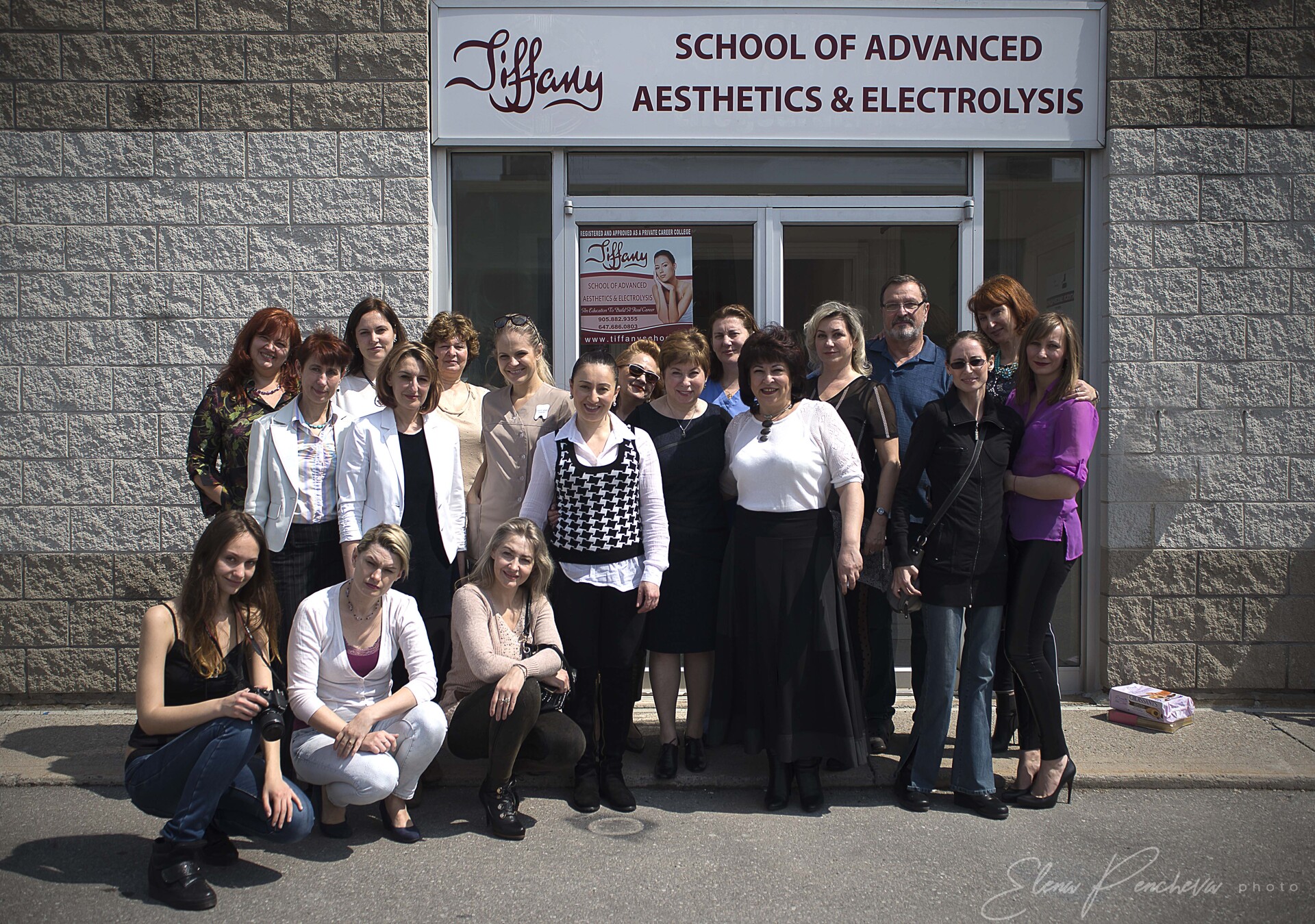
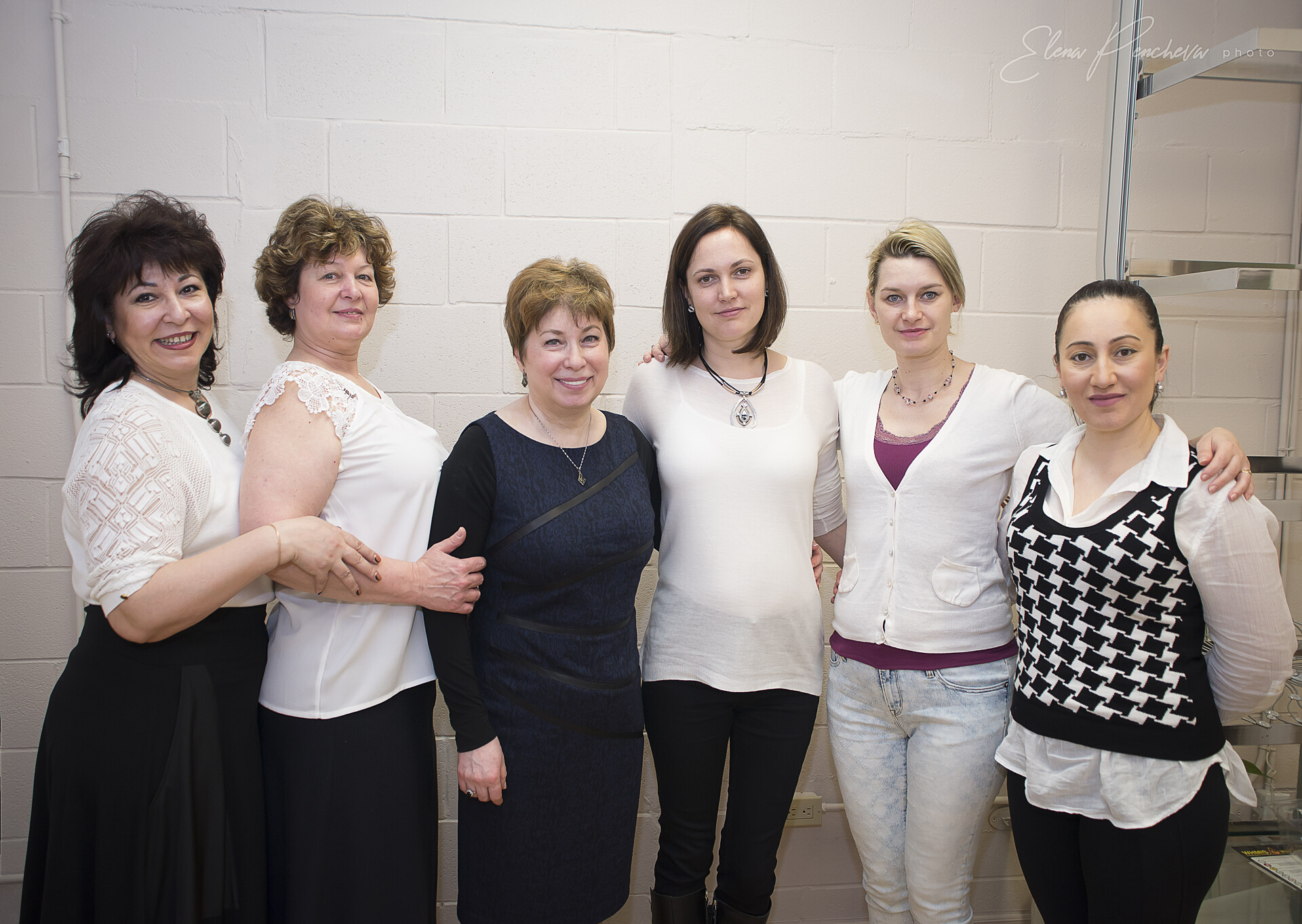
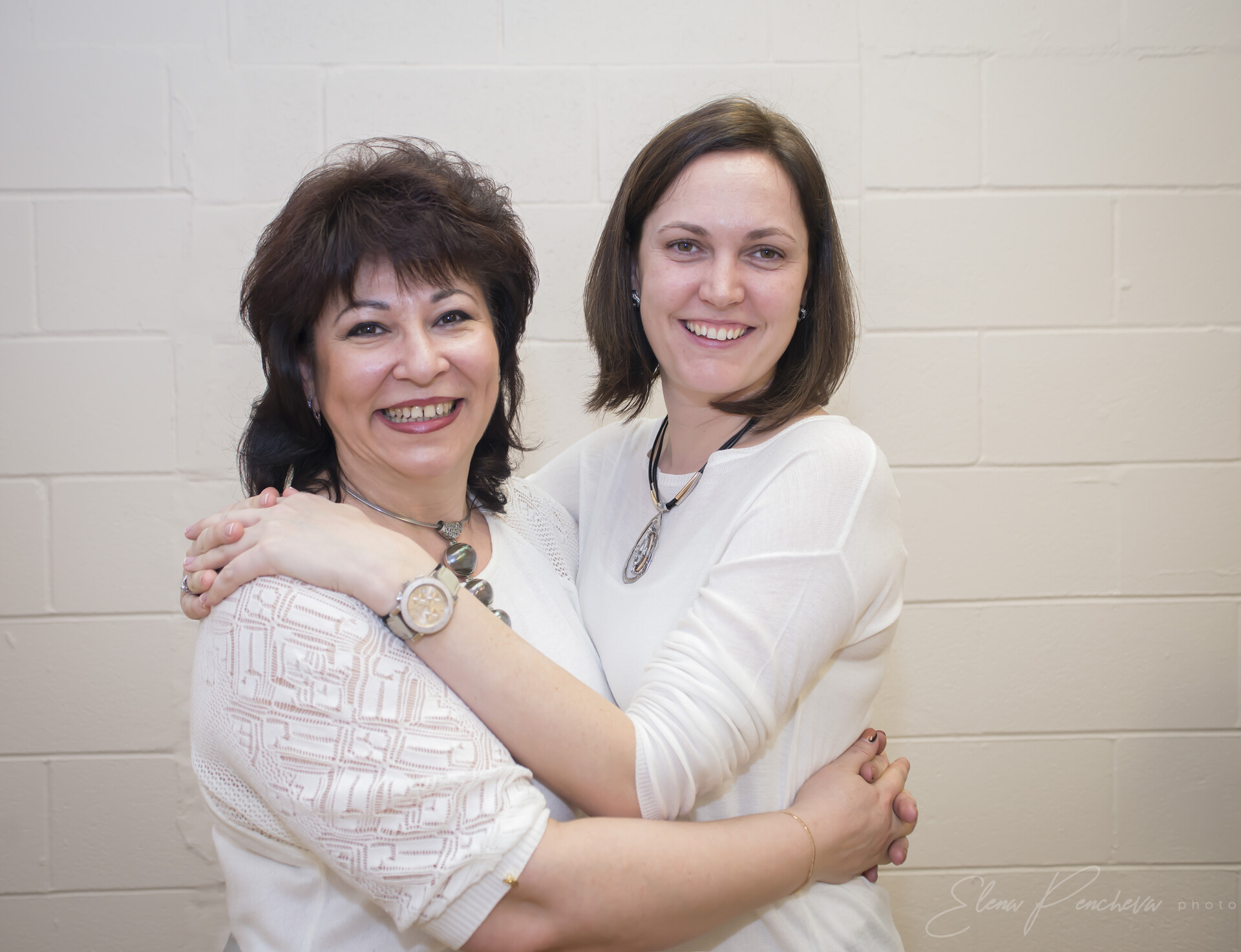
Address: 4646 Dufferin street, Unit 3, Toronto, Ontario
M3H 5S4
Phone: 905 882 9355

Welcome to Tiffany School






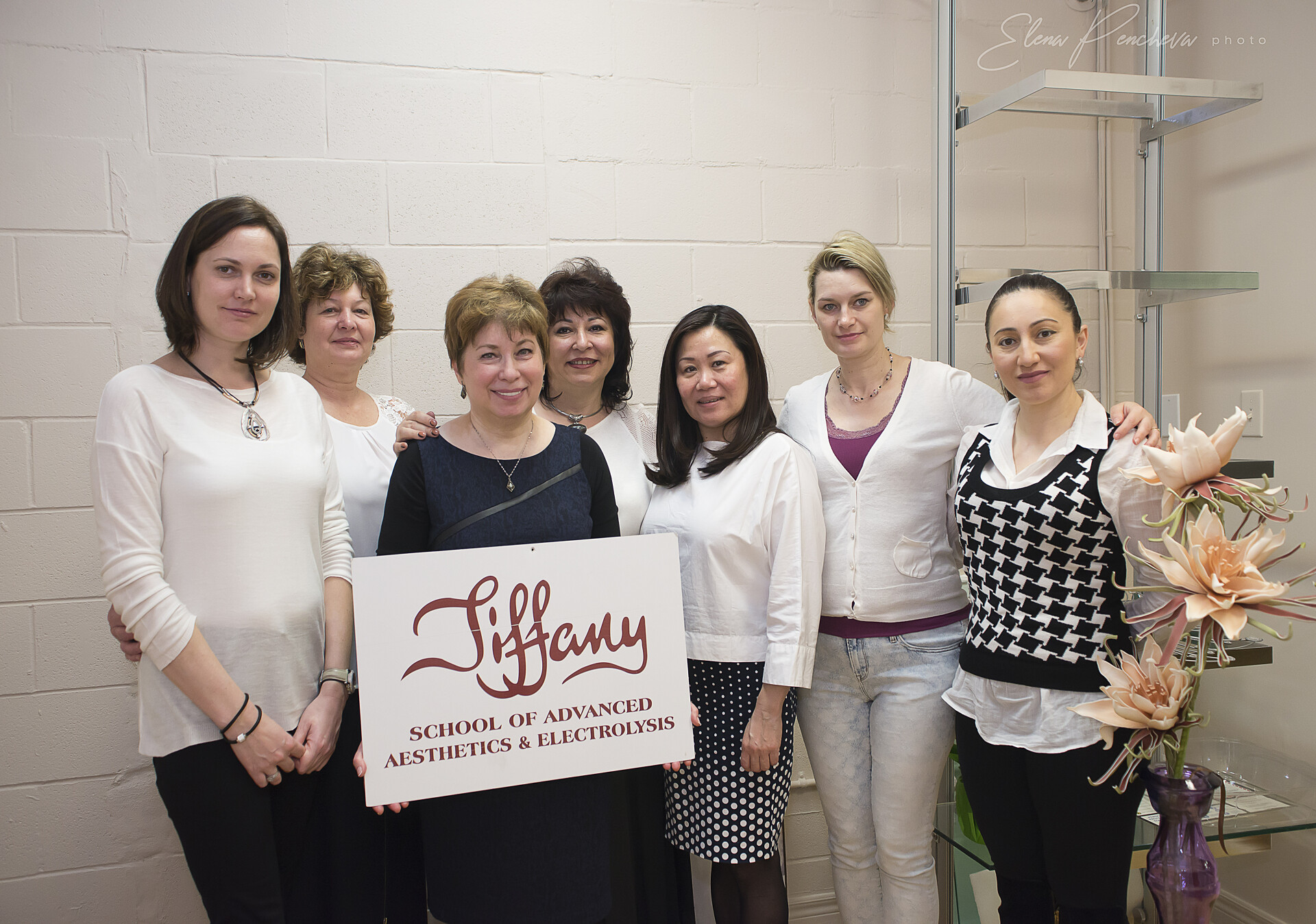

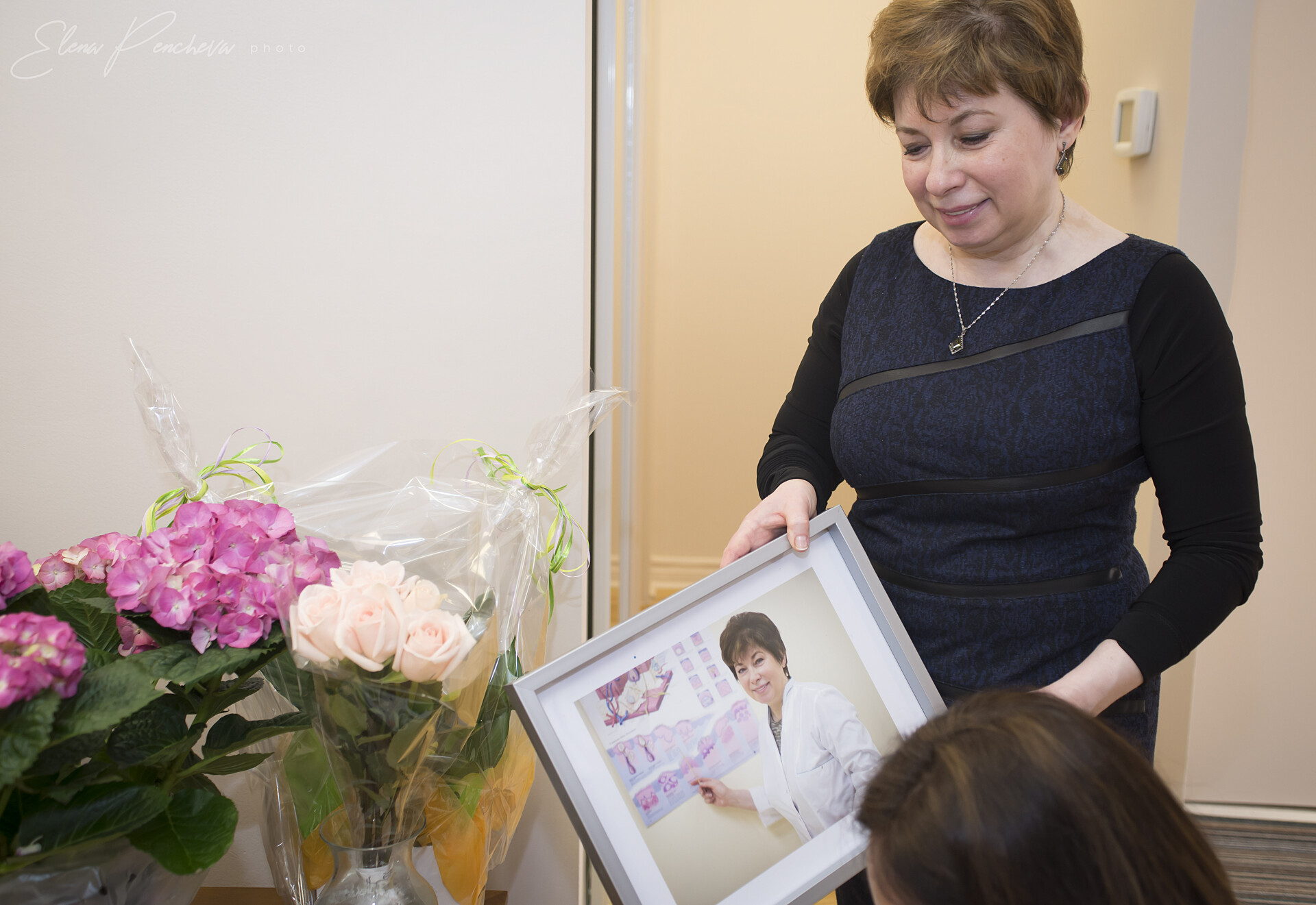

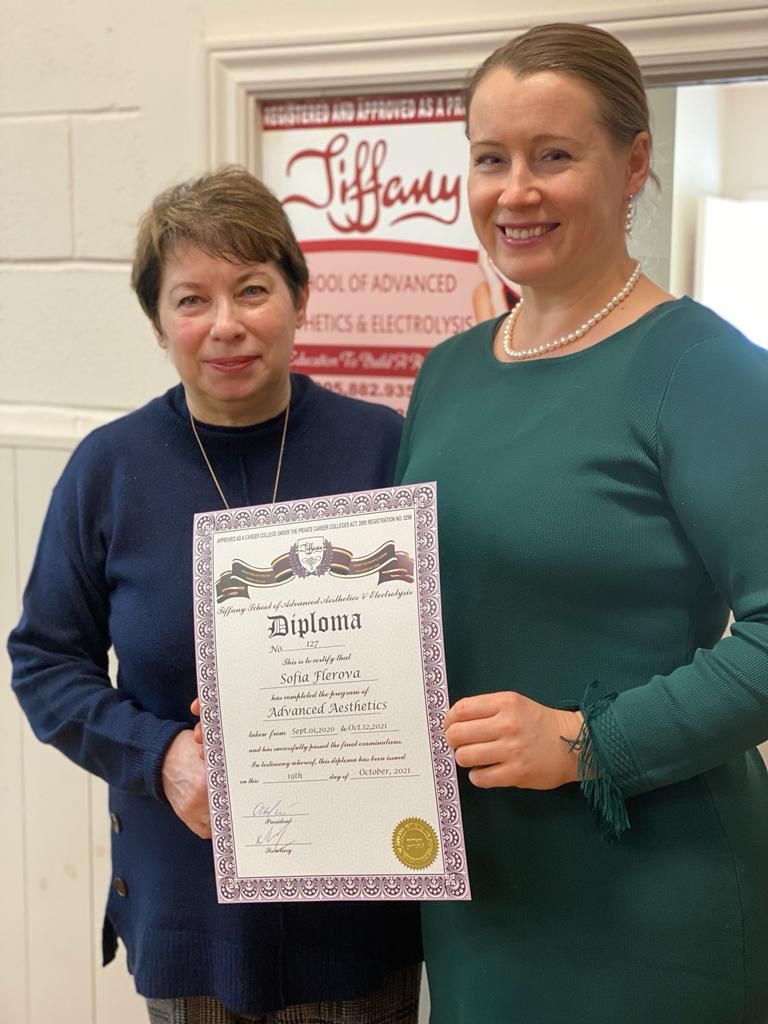



Address:
4646 Dufferin street, Unit 3, Toronto, Ontario, M3H 5S4
Phone: 905 882 9355
The best investments are investments in studies!

Политика конфиденциальности
Редактируемый текст
Данный сайт использует Cookie
Редактируемый текст
